Nava Atlas's Blog, page 19
May 22, 2023
The Enchanted April by Elizabeth von Arnim (1922)
The Enchanted April, the 1922 novel by the elusive Elizabeth Von Arnim, has stood the test of time as a journey of friendship and self-discovery.
Certain stories possess an irresistible charm that beckons readers to embark on captivating journeys of the heart and mind. Elizabeth von Arnim’s 1922 novel, The Enchanted April is one such masterpiece, fueling the imagination and evoking a sense of wonder.
The Enchanted April is a lighthearted (yet not lightweight) tale of freedom to live an authentic life, and the transformative power of female friendship. This literary gem continues to engage readers even after a century, effortlessly weaving together picturesque landscapes, relatable characters, and heartfelt emotions.
Elizabeth von Arnim’s skillful portrayal of authentic characters is a testament to the enduring appeal of this novel. Through their joys, sorrows, and vulnerabilities, we find glimpses of our own humanity reflected in their journeys.
Lotty Wilkins, Rose Arbuthnot, Lady Caroline Dester, and Mrs. Fisher endear themselves to readers as we accompany them on their quests for the rediscovery of their true selves. Within the embrace of the Italian paradise, these four women embark on an exploration of their desires, dreams, and unfulfilled passions.
Beyond its engaging characters, The Enchanted April captivates with its vivid descriptions of the Italian Riviera’s sun-drenched landscapes. Elizabeth von Arnim’s prose transports us to idyllic gardens where vibrant flowers bloom, and the gentle Mediterranean breeze whispers secrets of serenity and renewal.
With each turn of the page, we are enveloped in a world that appeals to our senses, inviting us to breathe in the fragrant air and bask in the golden sunlight.
. . . . . . . . . .
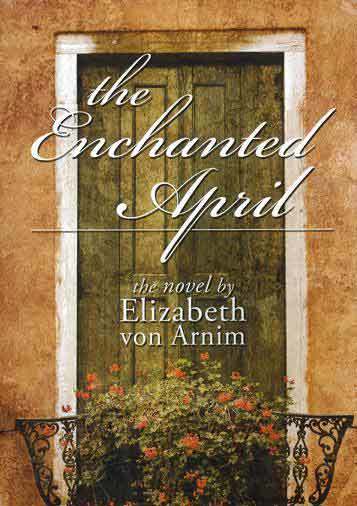
. . . . . . . . . .
Plot SummarySet against the backdrop of post-World War I England, the novel follows the lives of four seemingly dissimilar women whose paths happen to intertwine. Lotty Wilkins, Rose Arbuthnot, Lady Caroline Dester, and Mrs. Fisher respond to an advertisement inviting them to rent a medieval castle on the Italian Riviera for the month of April.
Eager to escape their unfulfilling lives, the four women embark on a journey that promises not only sunshine and beauty but also a chance for self-reflection and transformation.
Upon arriving at the idyllic San Salvatore, the magic of the place begins to work its charm on the ladies. The story delves into the women’s inner lives and desires, revealing their dreams, disappointments, and hidden aspirations.
As they immerse themselves in the Italian gardens and the soothing Mediterranean breezes, the ladies gradually shed their inhibitions and allow themselves to be transformed by the power of love and nature.
Themes, characters, & critical reception
The Enchanted April explores themes of liberation, personal growth, and the rekindling of one’s passions.
Lotty Wilkins, a timid and unfulfilled housewife, discovers her voice and inner strength in the embrace of San Salvatore. Burdened by her unhappy marriage, Rose Arbuthnot rediscovers her capacity for love and joy.
Additionally, the enigmatic Lady Caroline Dester, a famous socialite, learns to embrace vulnerability and opens herself to the possibility of genuine connection. Mrs. Fisher, a widow trapped in the memories of her past, finds solace and a renewed zest for life amidst the vibrant surroundings.
Elizabeth von Arnim’s nuanced character development paints a vivid portrait of women who defy societal expectations in their unique journeys of self-discovery. She highlights the universal desire for freedom, connection, and fulfillment through their interactions and revelations.
Since its publication, The Enchanted April has captivated readers and critics alike with its whimsical prose and profound storytelling. Contemporary reviews praised Elizabeth von Arnim’s ability to transport readers to the Italian Riviera, evoking a sense of escapism and tranquility.
. . . . . . . . . .

1991 film adaptation, titled Enchanted April
. . . . . . . . . .
The enduring appeal of The Enchanted April has inspired several adaptations, further cementing its place in popular culture. The novel was adapted into a successful 1935 film directed by Harry Beaumont and subsequently remade in 1991 by Mike Newell, gaining critical acclaim.
The story also reached the Broadway stage as a musical, with Matthew Barber’s theatrical adaptation premiering in 2003, receiving Tony Award nominations and captivating audiences with its enchanting portrayal of love and transformation.
ConclusionWhat sets this literary treasure apart is its ability to strike a chord with readers across generations. Elizabeth von Arnim’s exquisite prose captures the essence of human emotions, unveiling the complexities of the human spirit with grace and authenticity.
Her storytelling continues to resonate, reminding readers of the universal yearning for personal freedom, authentic connections, and a life of joy and purpose.
. . . . . . . . .

The stage musical went on to be performed in other venues,
including Hale Center Theater Orem
. . . . . . . . . .
From the original review in the Oakland Tribune, January 1923: The author of Elizabeth and her German Garden has written a humorous and satiric story of four women who rent an Italian castle.
“Elizabeth”* is to be thanked for the atmosphere and illusion she creates in The Enchanted April and she is to be congratulated warmly for Mrs. Wilkens.
It is an enchanted April this month in Italy, a story of smiles and solid enjoyment and one such as few writers could produce.
One may question the powers of reformation in Italian breezes and views and may wonder at the rapid changes the characters undergo. But one will question and wonder a long time after reading the book. The charm and the impression are that enduring.
Mrs. Wilkens is a shy and retiring woman who defers so much to her husband that she is without color and character. No one knows when she is present, no one even thinks of her. The husband, on the other hand, is the life of every party.
Then there is Rose Arbuthnot, deeply religious and becoming more and more self-centered because of the estrangement in her family. Her husband has written some memoirs of famous women who are none too particular in many ways. This grieves Rose and she won’t take any of his money except to give to charity.
Four lives are indeed changed
Another character in the cast, Lady Caroline, is so beautiful and so winning she cannot be cold and rude for her features and her voice will not betray her intent. She is selfish and she wished to be alone, to go away from everyone she knows, that she might think for once in her life.
With a Mrs. Fisher, more selfish than any, a regular tyrant in securing her rights, Rose and Lotty Wilkens rent a castle in Italy for a month.
The charm is worked on Mrs. Wilkens first. She is filled with the most glorious sensation of happiness imaginable and tries right away to spread the feeling to the rest.
The spell of the castle and of Italy works on all and four lives are changed. This is the story which in outline sounds a bit like Pollyanna, but which, because of the bright lines, flashes of humor, and keen observation is the best book that the new year has yet disclosed.
*Elizabeth von Arnim identified herself only as “Elizabeth” or “The author of Elizabeth and Her German Garden” as her nom de plume on many of her earlier books.
. . . . . . . . . .
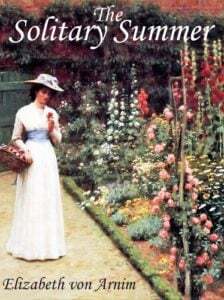
You may also enjoy:
The Solitary Summer by Elizabeth von Arnim. . . . . . . . . .
The post The Enchanted April by Elizabeth von Arnim (1922) appeared first on Literary Ladies Guide.
May 17, 2023
Robert Browning and Elizabeth Barrett: A Romantic Correspondence
In 1844, Elizabeth Barrett’s second major collection of poems (A Drama of Exile) was published and warmly received. The work included lines that praised fellow poet Robert Browning.
Presented here are the two letters that started the correspondence and ignited the romantic literary love story of Robert Browning and Elizabeth Barrett (who soon became Elizabeth Barrett Browning).
After reading the poems, Robert wrote a letter of thanks to Elizabeth on January 10, 1845, with the tantalizing line, “I love your verses with all my heart … and I love you, too.”
Their correspondence ensued until they met for the first time in the summer of 1845. Over the next several months, they became ever closer. Elizabeth remarked that she and Robert were “growing to be the truest of friends.”
Their courtship went on for twenty months, during which time they exchanged five hundred seventy-five letters, many of which are collected in The Letters of Robert Browning and Elizabeth Barrett, 1845 – 1846, and published much later (1900) by Smith, Elder & Co. in London.
A secret wedding and escape to ItalyOn September 12, 1846, Elizabeth and Robert were secretly married at Marylebone Church (her father didn’t approve). Not long after, the couple moved to Pisa, Italy to begin their life together.
Eventually learning of Elizabeth’s marriage, her father disowned her, refusing to see her or open letters she sent to him. Fortunately, after some time had passed, most of Elizabeth’s family accepted her marriage to Robert.
The two were inspired by their surroundings in Italy, and now, as Elizabeth Barrett Browning, she wrote a significant amount of poetry while living there.
Her most famous work, Sonnets from the Portuguese, was a collection of love poems that she wrote in the first few years of her marriage to Robert. The sonnet that begins with her most famous line, “How do I love thee? Let me count the ways,” is part of this collection.
To make these letters more readable, especially on devices, long paragraphs have been broken up, but otherwise, they remain intact. The volume in its entirety, if you’d like to read these very literary love letters, is found at The Letters of Robert Browning and Elizabeth Barrett, 1845 – 1846.
. . . . . . . . . .
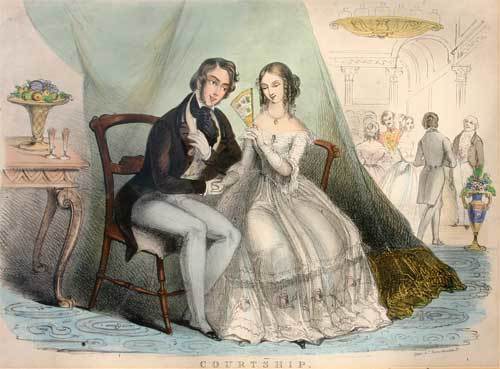
More about this romantic pair:
The Literary Love Story of Elizabeth Barrett and Robert Browning
. . . . . . . . . .
From: Robert Browning
New Cross, Hatcham, Surrey
January 10, 1845
I love your verses with all my heart, dear Miss Barrett — and this is no off-hand complimentary letter that I shall write,—whatever else, no prompt matter-of-course recognition of your genius, and there a graceful and natural end of the thing.
Since the day last week when I first read your poems, I quite laugh to remember how I have been turning and turning again in my mind what I should be able to tell you of their effect upon me, for in the first flush of delight I thought I would this once get out of my habit of purely passive enjoyment, when I do really enjoy, and thoroughly justify my admiration — perhaps even, as a loyal fellow-craftsman should, try and find fault and do you some little good to be proud of hereafter!
— But nothing comes of it all — so into me has it gone, and part of me has it become, this great living poetry of yours, not a flower of which but took root and grew —
Oh, how different that is from lying to be dried and pressed flat, and prized highly, and put in a book with a proper account at top and bottom, and shut up and put away … and the book called a ‘Flora,’ besides!
After all, I need not give up the thought of doing that, too, in time; because even now, talking with whoever is worthy, I can give a reason for my faith in one and another excellence, the fresh strange music, the affluent language, the exquisite pathos and true new brave thought; but in this addressing myself to you—your own self, and for the first time, my feeling rises altogether.
I do, as I say, love these books with all my heart — and I love you too. Do you know I was once not very far from seeing — really seeing you?
Mr. Kenyon said to me one morning ‘Would you like to see Miss Barrett?’ then he went to announce me — then he returned … you were too unwell, and now it is years ago, and I feel as at some untoward passage in my travels, as if I had been close, so close, to some world’s-wonder in chapel or crypt, only a screen to push and I might have entered, but there was some slight, so it now seems, slight and just sufficient bar to admission, and the half-opened door shut, and I went home my thousands of miles, and the sight was never to be?
Well, these Poems were to be, and this true thankful joy and pride with which I feel myself,
Yours ever faithfully,
Robert Browning
. . . . . . . . . .
Elizabeth Barrett’s first response to Robert BrowningFrom: Miss Barrett
50 Wimpole Street
January 11, 1845
I thank you, dear Mr. Browning, from the bottom of my heart. You meant to give me pleasure by your letter—and even if the object had not been answered, I ought still to thank you. But it is thoroughly answered.
Such a letter from such a hand! Sympathy is dear—very dear to me: but the sympathy of a poet, and of such a poet, is the quintessence of sympathy to me! Will you take back my gratitude for it?—agreeing, too, that of all the commerce done in the world, from Tyre to Carthage, the exchange of sympathy for gratitude is the most princely thing!
For the rest you draw me on with your kindness. It is difficult to get rid of people when you once have given them too much pleasure—that is a fact, and we will not stop for the moral of it.
What I was going to say—after a little natural hesitation—is, that if ever you emerge without inconvenient effort from your ‘passive state,’ and will tell me of such faults as rise to the surface and strike you as important in my poems, (for of course, I do not think of troubling you with criticism in detail) you will confer a lasting obligation on me, and one which I shall value so much, that I covet it at a distance.
I do not pretend to any extraordinary meekness under criticism and it is possible enough that I might not be altogether obedient to yours. But with my high respect for your power in your Art and for your experience as an artist, it would be quite impossible for me to hear a general observation of yours on what appear to you my master-faults, without being the better for it hereafter in some way.
I ask for only a sentence or two of general observation — and I do not ask even for that, so as to tease you — but in the humble, low voice, which is so excellent a thing in women—particularly when they go a-begging!
The most frequent general criticism I receive, is, I think, upon the style — ‘if I would but change my style’! But that is an objection (isn’t it?) to the writer bodily? Buffon says, and every sincere writer must feel, that ‘Le style c’est l’homme’; a fact, however, scarcely calculated to lessen the objection with certain critics.
Is it indeed true that I was so near to the pleasure and honour of making your acquaintance? and can it be true that you look back upon the lost opportunity with any regret? But — you know — if you had entered the ‘crypt,’ you might have caught cold, or been tired to death, and wished yourself ‘a thousand miles off;’ which would have been worse than travelling them.
It is not my interest, however, to put such thoughts in your head about its being ‘all for the best’; and I would rather hope (as I do) that what I lost by one chance I may recover by some future one. Winters shut me up as they do dormouse’s eyes; in the spring, we shall see: and I am so much better that I seem turning round to the outward world again.
And in the meantime I have learnt to know your voice, not merely from the poetry but from the kindness in it. Mr. Kenyon often speaks of you—dear Mr. Kenyon!—who most unspeakably, or only speakably with tears in my eyes — has been my friend and helper, and my book’s friend and helper! critic and sympathiser, true friend of all hours!
You know him well enough, I think, to understand that I must be grateful to him.
I am writing too much,—and notwithstanding that I am writing too much, I will write of one thing more.
I will say that I am your debtor, not only for this cordial letter and for all the pleasure which came with it, but in other ways, and those the highest: and I will say that while I live to follow this divine art of poetry, in proportion to my love for it and my devotion to it, I must be a devout admirer and student of your works. This is in my heart to say to you—and I say it.
And, for the rest, I am proud to remain
Your obliged and faithful
Elizabeth B. Barrett
The post Robert Browning and Elizabeth Barrett: A Romantic Correspondence appeared first on Literary Ladies Guide.
May 16, 2023
Muriel Spark, Author of The Prime of Miss Jean Brodie
Dame Muriel Spark (February 1, 1918 – April 13, 2006) was a Scottish novelist, short story writer, poet, and biographer.
Her novels were famous for their wit and style, and several have been adapted for film, television, and the stage. Her best-known work is the novelThe Prime of Miss Jean Brodie (1961).
Spark was quite prolific — in a nearly fifty-year career she wrote twenty-two novels, several collections of short stories, poetry, and nonfiction. She has been recognized as one of the greatest British writers.
Early years and education
Muriel Spark was born Muriel Sarah Camberg in Edinburgh, Scotland in 1918. Her father, Bernard, was Jewish and an engineer by profession. Her mother, Sarah, was a music teacher who had been raised Anglican.
She had one older brother, Philip, born in 1912, but the two were never close (with characteristic Spark wit, she once compared him to a Chekhov short story).
The family lived in the largely working-class Edinburgh suburb of Bruntsfield. Later, she would recall her childhood as financially tight but largely happy.
With the help of public bursaries, she went to the James Gillespie School for Girls, and then to a merchant school (much later, she would use this as the model for Marcia Blaine’s in The Prime of Miss Jean Brodie).
Muriel was interested in literature from a young age, and at age fourteen won first prize in a poetry competition commemorating Sir Walter Scott’s death a century earlier in 1832.
She signed up to study commercial and precis writing at Heriot-Watt College in Edinburgh, but didn’t go on to university, partly because her parents could not afford it, and partly because, in her opinion, “many older girls who were studying at Edinburgh University were humanly rather dull and earnest, without adult style or charm.” Instead, she studied secretarial skills and later worked in an Edinburgh department store.
A disastrous marriage
In 1937 she met Sydney Oswald Spark, known as “SOS,” in Edinburgh. He was thirteen years older than her, and a teacher about to embark on a three-year stint in Bulawayo, Southern Rhodesia (now Zimbabwe).
They married in September of that year and she followed him to Africa. Their son, Samuel Robin (known as Robin), was born in 1938.
Not much is known about this part of her life, and Muriel rarely spoke about it. However, it soon became clear that her husband suffered from manic depression and increasingly experienced violent episodes.
She became more and more unhappy, and left both Africa and her marriage in 1944, initially leaving Robin behind.
Later she wrote: “I was attracted to a man who brought me flowers when I had flu. (From my experience of life I believe my personal motto should be ‘beware of men bringing flowers’.)” She chose, however, to keep her husband’s name: “Camberg was a good name, but comparatively flat. Spark seemed to have some ingredient of life and fun.”
When Robin arrived in London in 1945, she sent him to live with his grandparents in Edinburgh while she set about making a living in London. She took several different jobs, including a stint with the Political Intelligence Department of the Foreign Office, and as editor of the Poetry Society’s magazine, Poetry Review, from 1947 – 1949.
. . . . . . . . . .
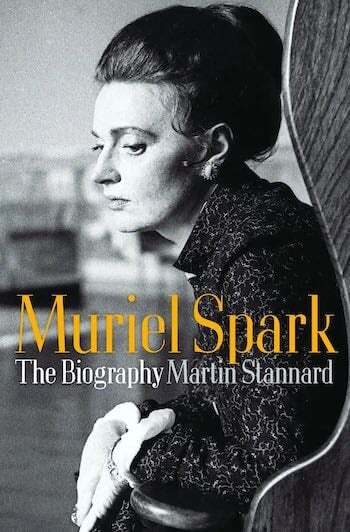
. . . . . . . . . .
The 1950s, and conversion to CatholicismMuriel Spark was also writing and publishing her own poetry. A first collection, The Fanfarlo and Other Verse, was published in 1952, just a year after she had entered a competition run by the Observer newspaper and won (out of almost seven thousand entries) with her poem “The Seraph and the Zambesi”
In the early 1950s, she also worked with literary journalist Derek Stanford on critical studies of Mary Shelley, Emily Brontë, and John Masefield. She edited volumes of Emily Brontë poems, Brontë letters, and Mary Shelley letters.
The strain of living on the margins of literary London — always financially precarious, popping diet pills in place of meals, and never quite knowing what was coming next — began to wear on her, and she suffered an emotional and physical collapse in 1954.
It was also a profoundly spiritual collapse. The year before she had been baptized into the Church of England, influenced heavily by T. S. Eliot and his writing (which, at the height of her breakdown, she believed contained secret messages in Ancient Greek), but now decided to convert to Roman Catholicism.
In her convalescence, she was supported by fellow convert Graham Greene (who sent her money and red wine on the condition that she would never pray for him), while a priest found her the Camberwell bedsit from which she would write her early novels. But she was never able to fully articulate why faith and religion had become so important to her at this point in her life.
“The simple explanation,” she said later, “is that I felt the Roman Catholic faith corresponded to what I had always known and believed; the more difficult explanation would involve the step by step building up of a conviction.”
At the same time as her conversion to Catholicism, her son Robin was embracing Judaism. It caused a family rift when he claimed that his maternal great-grandmother was Jewish and petitioned for her to be posthumously recognized as such.
Muriel retaliated by accusing him of seeking publicity to advance his art career. This dispute, which dug deeply and painfully into family history and heritage, lasted until her death. She took steps to ensure that her son received nothing from her estate.
A rich writing career
Muriel’s conversion to Catholicism profoundly influenced her writing. In a later interview, she said “somehow with my religion – whether one has anything to do with the other, I don’t know – but it does seem so, that I just gained confidence.”
Penelope Fitzgerald, a contemporary and fellow novelist, perhaps put it more succinctly: “…it wasn’t until she became a Roman Catholic … that she was able to see human existence as a whole, as a novelist needs to do.”
The first of more than twenty novels, The Comforters, was published in 1957. It established Muriel Spark’s distinctive voice and received excellent reviews (including those by Graham Greene and Evelyn Waugh, who wrote that he preferred The Comforters to his own The Ordeal of Gilbert Pinfold).
From then until the mid-1970s, she published almost a novel a year, as well as short stories, plays, essays, children’s books, and further collections of poetry.
. . . . . . . . . .
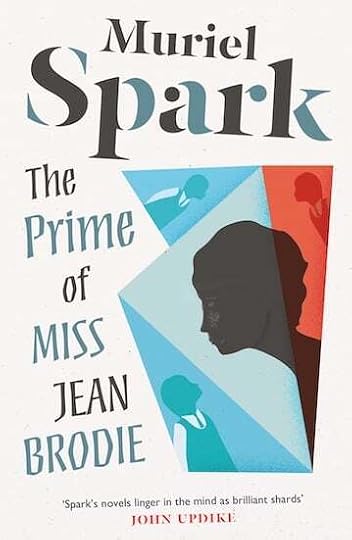
. . . . . . . . . .
The Prime of Miss Jean Brodie and other novelsWhat would become Muriel Spark’s best-known novel, The Prime of Miss Jean Brodie, was published in 1961.
The tale of the middle-aged Edinburgh schoolteacher became legendary. Its success on Broadway, and in film and television versions ensured that Muriel was financially secure for life. The 1969 film starred a young Maggie Smith, and is considered a cinematic classic.
Two other novels were also adapted for film: The Driver’s Seat (1970) starring Elizabeth Taylor and The Abbess of Crewe (1974) starring Glenda Jackson.
Other novels were adapted for television (The Girls of Slender Means published in 1963), for radio (The Ballad of Peckham Rye published in 1960), and for stage (Memento Mori and Doctors of Philosophy).
Escape to Italy
In 1963 Muriel left Britain for good. Mostly, she confessed, it was to escape those friends from whom her sudden success had estranged her. She was particularly keen to avoid Derek Stanford, who had published a conflicted, slightly disturbing memoir of her, based on the years they collaborated.
She moved first to New York, where she worked as a staff writer at The New Yorker. Editor William Shawn was a supporter of her writing, having published The Prime of Miss Jean Brodie in full in one issue of the magazine.
By the time she moved to Rome in 1967, she had invented herself almost as a character in one of her novels: chic, with perfect hair and nails, expensive jewelry and furs. Living in an immaculately decorated apartment just across from the Vatican, she self-styled as the epitome of wit and success.
In 1968 she met Penelope Jardine, a rich young woman studying art in Rome. Together they traveled to Oliveto in Tuscany and settled there to live and work. There they remained until Muriel’s death in 2006. Visitors reported that she was bright, happy, and less worried about dressing well: “There isn’t really a need for it here.” She enjoyed watching TV soaps in bed.
Muriel continued to write, sometimes spinning out stories in a single draft in spiral bound notebooks from the Edinburgh stationers James Thin, using one side of the paper only. Her last novel, aptly (or ironically) titled The Finishing School, was published in 2004.
Critical reception of Muriel Spark’s work
Muriel Spark was always something of a controversial author among certain readers. Her particular brand of waspish Catholic chic was often mistaken for right-wing tendencies, and feminists in particular often distrusted her work. In addition, the brevity of her novels led many critics to dismiss them as light and trivial.
However, more recently, John Lanchester, in his introduction to a Penguin edition of The Driver’s Seat, wrote that she should be viewed more as:
“… proto Post-Modernist, a writer with a sharp and lasting interest in the arbitrariness of fictional conventions; a writer whose eager adoption of the conventions of the novel have always been accompanied by a wish to toy with, subvert, parody, and undermine them.”
In a 2014 essay in The New Yorker, Parul Sehgal wrote of The Girls of Slender Means, “This is Spark’s particular genius: the cruelty mixed with camp, the lightness of touch, the flick of the wrist that lands the lash.”
She was also often referred to, especially during the 1990s, as “the greatest living British writer,” and counted W. H. Auden, John Updike, Tennessee Williams, and Iris Murdoch among her admirers.
. . . . . . . . . .
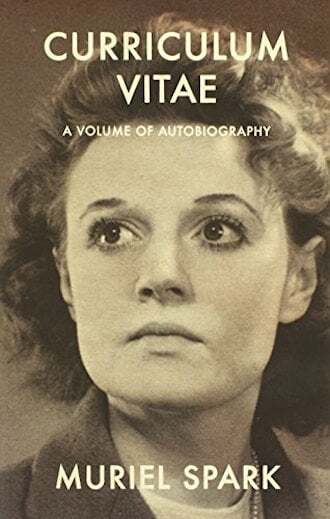
. . . . . . . . . .
Curriculum Vitae: A “clearly disappointing” autobiographyMuriel Spark rarely appeared on television or radio and was notoriously private about her life. This reticence helped to turn her 1992 autobiography, Curriculum Vitae, into the literary event of the year.
However, it was as notable for what it didn’t tell as for what it did. Like most of her books, it was short, and the narrative ended with the publication of her first novel.
Novelist Anita Brookner said that “as an account of a writer’s formation Curriculum Vitae is clearly disappointing,” while biographer Victoria Glendinning remarked that “one cannot tell from this book which people, if any, she loved with a passion.”
On the more positive side, Jenny Turner noted that “Although it skates over many things about which eager beavers may want to know more: Muriel’s disastrous teenage marriage … her twenties in Rhodesia … her son from that marriage … none of this is anybody’s business but Spark’s own.”
Muriel Spark’s legacy
Muriel Spark died on April 13, 2006, and is buried in the cemetery of Sant’ Andrea Apostolo in Oliveto. Her entire estate was left to Jardine, while her personal archive is held at the National Library of Scotland.
During her lifetime she received honorary degrees from universities including Oxford, Aberdeen, Edinburgh, London, and the American University of Paris. She was elected a Companion of Literature by the Royal Society of Literature, and an Honorary Member of the Royal Society of Edinburgh.
She was also an Honorary Member of the American Academy of Arts and Letters and was made a Dame of the British Empire in 1993.
Today, all of Muriel Spark’s novels remain in print and continue to be popular. In 2008, The Times of London ranked her eighth in its list of the “50 greatest British writers since 1945” and in 2010 she was posthumously shortlisted for the Lost Man Booker Prize of 1970 for The Driver’s Seat.
. . . . . . . . . .
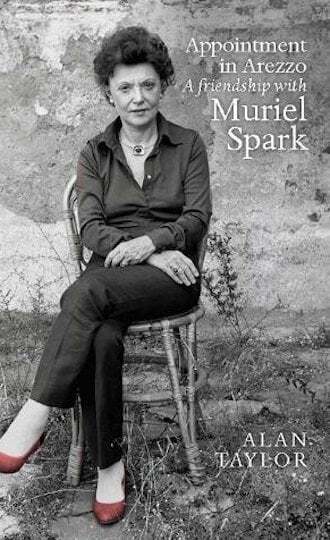
. . . . . . . . .
Contributed by Elodie Barnes. Elodie is a writer and editor with a serious case of wanderlust. Her short fiction has been widely published online and is included in the Best Small Fictions 2022 Anthology published by Sonder Press. She is Books & Creative Writing Editor at Lucy Writers Platform, she is also co-facilitating What the Water Gave Us, an Arts Council England-funded anthology of emerging women writers from migrant backgrounds. She is currently working on a collection of short stories, and when not writing can usually be found planning the next trip abroad, or daydreaming her way back to 1920s Paris. Find her online at Elodie Rose Barnes.
More about Muriel SparkMajor works: Novels, short stories, poems, and essays
All of Muriel Spark’s novels are still in print in various editions, including a full set of hardback Centenary Editions published by Polygon (Birlinn) in 2018. Muriel Spark’s list of published works is quite extensive; see her full bibliography.
Biography and criticism
Curriculum Vitae by Muriel Spark (an autobiography, 1992)Muriel Spark: The Biography by Martin Stannard (2010)Appointment in Arezzo: A Friendship with Muriel Spark by Alan Taylor (2017)A Good Comb, edited by Penelope Jardine (2018)More information
Obituary in The Guardian Reader discussions of Muriel Spark’s books on Goodreads The Best Books by Muriel Spark Jewish Women’s Archive WikipediaThe post Muriel Spark, Author of The Prime of Miss Jean Brodie appeared first on Literary Ladies Guide.
May 1, 2023
Literary Ladies Guide to the Writing Life by Nava Atlas
Literary Ladies Guide to the Writing Life: Inspiration and Advice from Celebrated Women Authors Who Paved the Way by Nava Atlas (2011) is now available as an audiobook (updated and expanded) produced by Blackstone Publishing (2023).
The desire to put pen to paper has been described by many writers as an obsession that can’t be denied. Perhaps best expressed by author Anaïs Nin, who writes, “You write out of a deep inner necessity. If you are a writer, you have to write, just as you have to breathe…”
In Literary Ladies’ Guide to the Writing Life, Nava Atlas presents a treasury of intimate glimpses into the unfolding writing process across fifteen brilliant careers in women’s literature and relates their struggles, striving, and successes to those experienced by women writers today.
About the 2023 audiobook
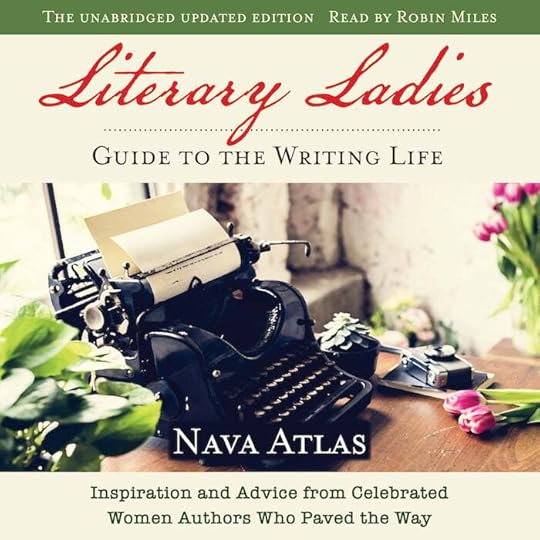
From the publisher: Author and artist Nava Atlas presents a treasury of intimate glimpses into the unfolding creative writing process across fifteen brilliant careers in women’s literature and relates their stories to women writers of today.
Through their journals, letters, and diaries, we get to know the struggles and triumphs of Louisa May Alcott, Jane Austen, Charlotte Bronte, Gwendolyn Brooks, Octavia E. Butler, Willa Cather, Madeleine LEngle, Edna Ferber, Zora Neale Hurston, L.M. Montgomery, Anais Nin, George Sand, Harriet Beecher Stowe, Edith Wharton, and Virginia Woolf.
Atlas’s own insightful commentary, newly updated, lifts the curtain on these women’s writing lives and provides reassuring tips and advice on such subjects as finding your voice, self-discipline, dealing with rejection, money matters, balancing family with the solitary writing process, and more. This guide will resonate with women writers in today’s world, at any stage of their journey.
Available on Audible, Apple, and wherever audiobooks can be downloaded
PLEASE NOTE: When you purchase this title from Audible, the accompanying PDF will be available in your Audible Library along with the audio.
©2011 Nava Atlas (P) 2023 Blackstone Publishing | Narrated by: Robin Miles | 6 hrs and 54 mins. . . . . . . . . . . .
About the 2011 book
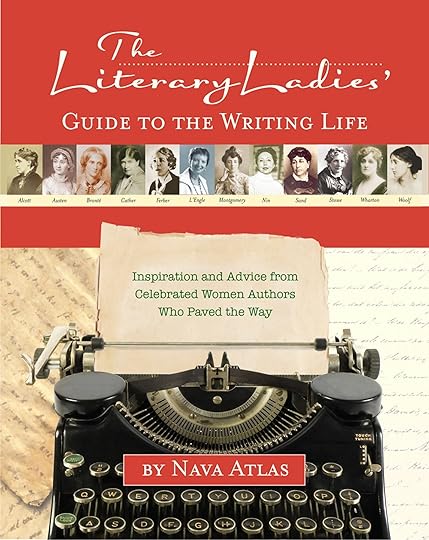
In Literary Ladies’ Guide to the Writing Life, Nava Atlas presents a treasury of intimate glimpses into the unfolding creative writing process across twelve brilliant careers in women’s literature and relates their stories to women writers of today.
Drawing from diaries, journals, letters, memoirs and interviews, Atlas reveals the views of twelve classic women authors on the subjects of importance to every writer—the creative process, the inner critic, finding the time to write, rejection and acceptance, and developing a “voice.” The pages of this book are a feast for the eyes as well, with 130 vintage full-color photographs and illustrations
Atlas provides her own illuminating commentary and discusses how the lessons of classic women writers of the past still resonate with women writing in the present.
Within these pages, Atlas delves into the lives of these and other classic authors of the past to find lessons for women writing today. From learning how to stay disciplined, focused, and not getting distracted to finding tools of motivation and methods of practice, readers are able to find comfort and reassurance from some of our most beloved women authors.
. . . . . . . . . . .
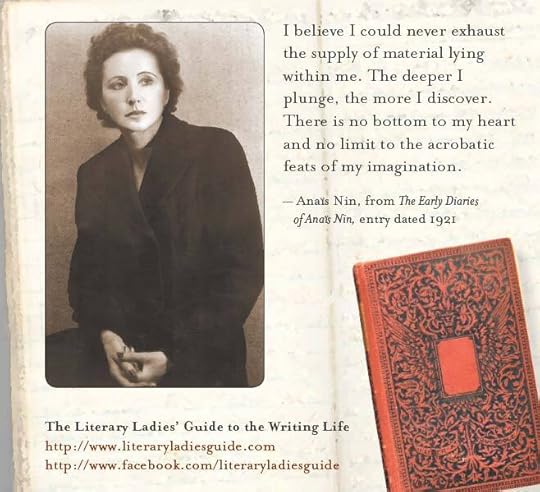
. . . . . . . . . . .
About Nava AtlasThough Nava is best known as the author of many books on vegan and vegetarian cooking, she also produces visual books on women’s issues, including the book shown here.
Nava Atlas is also an active fine artist. Her work is shown and collected by museums and universities across the U.S. You can see her work at navaatlasart.com. Her home is in the Hudson Valley region of New York State.
More about Nava can be found on her Wikipedia page, and in her permanent archive of papers at Duke University’s Rubenstein Library.
The post Literary Ladies Guide to the Writing Life by Nava Atlas appeared first on Literary Ladies Guide.
April 29, 2023
13 Love Poems by Edna St. Vincent Millay
Though Edna St. Vincent Millay wasn’t considered a confessional poet, her prolific love life was often reflected in her lines, sometimes obliquely, other times directly. Following is a small sampling of love poems by Edna St. Vincent Millay.
Some of Millay’s love poems hint at cynicism, others sorrow, while others still reflect a women in full charge of her sexuality and aware of her power over those whose hearts she won — or broke.
It has been argued that tales of Millay’s love life have eclipsed her reputation as a poet — and that this should be corrected, as she was a brilliant poet. In hindsight unjustly, er reputation began waning even before her untimely death.
Vincent, as she preferred to be called, entered Vassar College in 1913 at age 21. Several years older than her fellow freshmen (who were women, as at the time it was an all-girls school), she soon became aware of her power to attract members of both sexes, and used this to her advantage in her journey to become one of the most celebrated poet of the 1920s and 1930s.
According to J.D. McClatchley, editor of Edna St. Vincent Millay: Selected Poems (2002):
“‘People fall in love with me … and annoy me and distress me and flatter me and excite me.’ And she responded in kind; there were torrid affairs with girls at school, adding to her campus notoriety, and tepid flings with older men who might help her career.
Throughout her life, she did what she felt she must do in order to create the conditions necessary to accomplish her work … After Vassar, she became the Circe of Greenwich Village. She was soon the talk of the town.
Her affairs were sometimes of the heart, and sometimes more practical. The writers she took as lovers (and invariably kept as friends afterward) … were in a position to both teach and help her. And she had always been a quick study. The poems she wrote then — wild, cool, elusive — intoxicated the Jazz Babies. She had found the pulse of the new generation.”
The love poems by Edna St. Vincent Millay presented here are from her first four collections; all are in the public domain. The poems included here are:
Ashes of LifeThe DreamIndifferenceRecuerdoThursdayThe PhilosopherPasser Mortuus EstAlms EbbI, Being Born a WomanWhat Lips My Lips Have KissedLoving You Less Than LifeThe Spring and the Fall. . . . . . . . . .
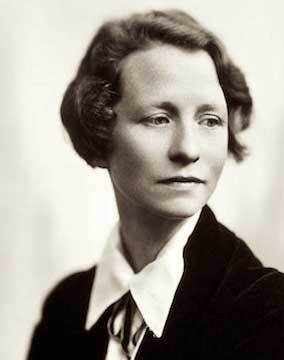
Learn more about Edna St. Vincent Millay
. . . . . . . . . .
This is but a sampling of Millay’s poems that deal with the affairs of the heart. You’ll find these early collections in full on this site:
Renascence and Other Poems A Few Figs From Thistles Second April The Harp-Weaver and Other Poems See another sampling: 12 Iconic Poems by Edna St. Vincent Millay .. . . . . . . . . .
ASHES OF LIFE
Love has gone and left me and the days are all alike;
Eat I must, and sleep I will,—and would that night were here!
But ah!—to lie awake and hear the slow hours strike!
Would that it were day again!—with twilight near!
Love has gone and left me and I don’t know what to do;
This or that or what you will is all the same to me;
But all the things that I begin I leave before I’m through,—
There’s little use in anything as far as I can see.
Love has gone and left me,—and the neighbors knock and borrow,
And life goes on forever like the gnawing of a mouse,—
And to-morrow and to-morrow and to-morrow and to-morrow
There’s this little street and this little house.
(From Renascence and other Poems, 1917
Analysis of “Ashes of Life”)
. . . . . . . . . .
THE DREAM
Love, if I weep it will not matter,
And if you laugh I shall not care;
Foolish am I to think about it,
But it is good to feel you there.
Love, in my sleep I dreamed of waking,—
White and awful the moonlight reached
Over the floor, and somewhere, somewhere,
There was a shutter loose,—it screeched!
Swung in the wind,—and no wind blowing!—
I was afraid, and turned to you,
Put out my hand to you for comfort,—
And you were gone! Cold, cold as dew,
Under my hand the moonlight lay!
Love, if you laugh I shall not care,
But if I weep it will not matter,—
Ah, it is good to feel you there!
(From Renascence and other Poems, 1917)
. . . . . . . . . .
INDIFFERENCE
I said,—for Love was laggard, O, Love was slow to come,—
“I’ll hear his step and know his step when I am warm in bed;
But I’ll never leave my pillow, though there be some
As would let him in—and take him in with tears!” I said.
I lay,—for Love was laggard, O, he came not until dawn,—
I lay and listened for his step and could not get to sleep;
And he found me at my window with my big cloak on,
All sorry with the tears some folks might weep!
(From Renascence and other Poems, 1917)
. . . . . . . . . .
RECUERDO
We were very tired, we were very merry—
We had gone back and forth all night on the ferry.
It was bare and bright, and smelled like a stable—
But we looked into a fire, we leaned across a table,
We lay on a hill-top underneath the moon;
And the whistles kept blowing, and the dawn came soon.
We were very tired, we were very merry—
We had gone back and forth all night on the ferry;
And you ate an apple, and I ate a pear,
From a dozen of each we had bought somewhere;
And the sky went wan, and the wind came cold,
And the sun rose dripping, a bucketful of gold.
We were very tired, we were very merry,
We had gone back and forth all night on the ferry.
We hailed, “Good morrow, mother!” to a shawl-covered head,
And bought a morning paper, which neither of us read;
And she wept, “God bless you!” for the apples and pears,
And we gave her all our money but our subway fares.
(From A Few Figs from Thistles, 1921
Analysis of “Recuerdo”)
. . . . . . . . .
THURSDAY
And if I loved you Wednesday,
Well, what is that to you?
I do not love you Thursday—
So much is true.
And why you come complaining
Is more than I can see.
I loved you Wednesday,—yes—but what
Is that to me?
(From A Few Figs from Thistles, 1921
Analysis of “Thursday”)
. . . . . . . . . .
THE PHILOSOPHER
And what are you that, wanting you
I should be kept awake
As many nights as there are days
With weeping for your sake?
And what are you that, missing you,
As many days as crawl
I should be listening to the wind
And looking at the wall?
I know a man that’s a braver man
And twenty men as kind,
And what are you, that you should be
The one man in my mind?
Yet women’s ways are witless ways,
As any sage will tell,—
And what am I, that I should love
So wisely and so well?
(From A Few Figs from Thistles, 1921)
. . . . . . . . . .
PASSER MORTUUS EST
Death devours all lovely things;
Lesbia with her sparrow
Shares the darkness,—presently
Every bed is narrow.
Unremembered as old rain
Dries the sheer libation,
And the little petulant hand
Is an annotation.
After all, my erstwhile dear,
My no longer cherished,
Need we say it was not love,
Now that love is perished?
(From Second April, 1921)
. . . . . . . . . .
ALMS
My heart is what it was before,
A house where people come and go;
But it is winter with your love,
The sashes are beset with snow.
I light the lamp and lay the cloth,
I blow the coals to blaze again;
But it is winter with your love,
The frost is thick upon the pane.
I know a winter when it comes:
The leaves are listless on the boughs;
I watched your love a little while,
And brought my plants into the house.
I water them and turn them south,
I snap the dead brown from the stem;
But it is winter with your love,—
I only tend and water them.
There was a time I stood and watched
The small, ill-natured sparrows’ fray;
I loved the beggar that I fed,
I cared for what he had to say,
I stood and watched him out of sight;
Today I reach around the door
And set a bowl upon the step;
My heart is what it was before,
But it is winter with your love;
I scatter crumbs upon the sill,
And close the window,—and the birds
May take or leave them, as they will.
(From Second April, 1921
Analysis of “Alms”)
. . . . . . . . . .
EBB
I know what my heart is like
Since your love died:
It is like a hollow ledge
Holding a little pool
Left there by the tide,
A little tepid pool,
Drying inward from the edge.
(From Second April, 1921
Analysis of “Ebb”)
. . . . . . . . . .
I, BEING BORN A WOMAN
I, being born a woman and distressed
By all the needs and notions of my kind,
Am urged by your propinquity to find
Your person fair, and feel a certain zest
To bear your body’s weight upon my breast:
So subtly is the fume of life designed,
To clarify the pulse and cloud the mind,
And leave me once again undone, possessed.
Think not for this, however, the poor treason
Of my stout blood against my staggering brain,
I shall remember you with love, or season
My scorn with pity, — let me make it plain:
I find this frenzy insufficient reason
For conversation when we meet again.
(From The Harp-Weaver and Other Poems, 1922
Analysis of “I, Being Born a Woman“)
. . . . . . . . . .
WHAT LIPS MY LIPS HAVE KISSED
What lips my lips have kissed, and where, and
why,
I have forgotten, and what arms have lain
Under my head till morning; but the rain
Is full of ghosts to-night, that tap and sigh
Upon the glass and listen for reply,
And in my heart there stirs a quiet pain
For unremembered lads that not again
Will turn to me at midnight with a cry.
Thus in the winter stands the lonely tree,
Nor knows what birds have vanished one by one,
Yet knows its boughs more silent than before:
I cannot say what loves have come and gone,
I only know that summer sang in me
A little while, that in me sings no more.
(From The Harp-Weaver and Other Poems, 1922
Analysis of “What Lips My Lips Have Kissed”)
. . . . . . . . . .
LOVING YOU LESS THAN LIFE
Loving you less than life, a little less
Than bitter-sweet upon a broken wall
Or brush-wood smoke in autumn, I confess
I cannot swear I love you not at all.
For there is that about you in this light–
A yellow darkness, sinister of rain–
Which sturdily recalls my stubborn sight
To dwell on you, and dwell on you again.
And I am made aware of many a week
I shall consume, remembering in what way
Your brown hair grows about your brow and
cheek,
And what divine absurdities you say:
Till all the world, and I, and surely you,
Will know I love you, whether or not I do.
(From The Harp-Weaver and Other Poems, 1922)
. . . . . . . . . .
THE SPRING AND THE FALL
In the spring of the year, in the spring of the year,
I walked the road beside my dear.
The trees were black where the bark was wet.
I see them yet, in the spring of the year.
He broke me a bough of the blossoming peach
That was out of the way and hard to reach.
In the fall of the year, in the fall of the year,
I walked the road beside my dear.
The rooks went up with a raucous trill.
I hear them still, in the fall of the year.
He laughed at all I dared to praise,
And broke my heart, in little ways.
Year be springing or year be falling,
The bark will drip and the birds be calling.
There’s much that’s fine to see and hear
In the spring of a year, in the fall of a year.
‘Tis not love’s going hurts my days,
But that it went in little ways.
(From The Harp-Weaver and Other Poems, 1922)
The post 13 Love Poems by Edna St. Vincent Millay appeared first on Literary Ladies Guide.
April 28, 2023
The Daughters of the Late Colonel by Katherine Mansfield (full text)
“The Daughters of the Late Colonel” by Katherine Mansfield is a modernist short story. New Zealand-born Mansfield (1888 – 1923) has been recognized for revolutionizing the short story form.
“The Daughters of the Late Colonel” is considered among her most highly regarded stories, along with “At the Bay,” “The Voyage,” and “The Stranger.”
Written in 1920, this story (now in the public domain) was first published in The London Mercury in 1921, and was later part of Mansfield’s short story collection, The Garden Party and Other Stories.
Summaries and analyses of The Daughters of the Late Colonel
Summary and analysis on LitCharts A short analysis on Interesting Literature Analysis on Literary Theory and Criticism. . . . . . . . . .
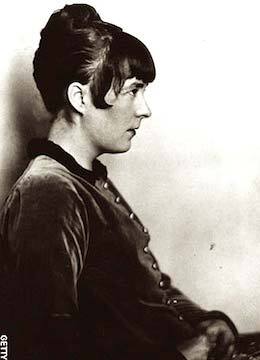
Learn more about Katherine Mansfield
. . . . . . . . . .
I
The week after was one of the busiest weeks of their lives. Even when they went to bed it was only their bodies that lay down and rested; their minds went on, thinking things out, talking things over, wondering, deciding, trying to remember where …
Constantia lay like a statue, her hands by her sides, her feet just overlapping each other, the sheet up to her chin. She stared at the ceiling.
“Do you think father would mind if we gave his top-hat to the porter?”
“The porter?” snapped Josephine. “Why ever the porter? What a very extraordinary idea!”
“Because,” said Constantia slowly, “he must often have to go to funerals. And I noticed at—at the cemetery that he only had a bowler.” She paused. “I thought then how very much he’d appreciate a top-hat. We ought to give him a present, too. He was always very nice to father.”
“But,” cried Josephine, flouncing on her pillow and staring across the dark at Constantia, “father’s head!” And suddenly, for one awful moment, she nearly giggled. Not, of course, that she felt in the least like giggling. It must have been habit.
Years ago, when they had stayed awake at night talking, their beds had simply heaved. And now the porter’s head, disappearing, popped out, like a candle, under father’s hat…. The giggle mounted, mounted; she clenched her hands; she fought it down; she frowned fiercely at the dark and said “Remember” terribly sternly.
“We can decide to-morrow,” she said.
Constantia had noticed nothing; she sighed.
“Do you think we ought to have our dressing-gowns dyed as well?”
“Black?” almost shrieked Josephine.
“Well, what else?” said Constantia. “I was thinking—it doesn’t seem quite sincere, in a way, to wear black out of doors and when we’re fully dressed, and then when we’re at home—”
“But nobody sees us,” said Josephine. She gave the bedclothes such a twitch that both her feet became uncovered, and she had to creep up the pillows to get them well under again.
“Kate does,” said Constantia. “And the postman very well might.”
Josephine thought of her dark-red slippers, which matched her dressing-gown, and of Constantia’s favourite indefinite green ones which went with hers. Black! Two black dressing-gowns and two pairs of black woolly slippers, creeping off to the bathroom like black cats.
“I don’t think it’s absolutely necessary,” said she.
Silence. Then Constantia said, “We shall have to post the papers with the notice in them to-morrow to catch the Ceylon mail…. How many letters have we had up till now?”
“Twenty-three.”
Josephine had replied to them all, and twenty-three times when she came to “We miss our dear father so much” she had broken down and had to use her handkerchief, and on some of them even to soak up a very light-blue tear with an edge of blotting-paper. Strange! She couldn’t have put it on—but twenty-three times. Even now, though, when she said over to herself sadly “We miss our dear father so much,” she could have cried if she’d wanted to.
“Have you got enough stamps?” came from Constantia.
“Oh, how can I tell?” said Josephine crossly. “What’s the good of asking me that now?”
“I was just wondering,” said Constantia mildly.
Silence again. There came a little rustle, a scurry, a hop.
“A mouse,” said Constantia.
“It can’t be a mouse because there aren’t any crumbs,” said Josephine.
“But it doesn’t know there aren’t,” said Constantia.
A spasm of pity squeezed her heart. Poor little thing! She wished she’d left a tiny piece of biscuit on the dressing-table. It was awful to think of it not finding anything. What would it do?
“I can’t think how they manage to live at all,” she said slowly.
“Who?” demanded Josephine.
And Constantia said more loudly than she meant to, “Mice.”
Josephine was furious. “Oh, what nonsense, Con!” she said. “What have mice got to do with it? You’re asleep.”
“I don’t think I am,” said Constantia. She shut her eyes to make sure. She was.
Josephine arched her spine, pulled up her knees, folded her arms so that her fists came under her ears, and pressed her cheek hard against the pillow.
. . . . . . . . . .
MORE FULL TEXTS OF MANSFIELD SHORT STORIES
“Bliss ” (1918)
“Miss Brill” (1920)
“The Garden Party” (1920)
. . . . . . . . . .
II
Another thing which complicated matters was they had Nurse Andrews staying on with them that week. It was their own fault; they had asked her. It was Josephine’s idea. On the morning—well, on the last morning, when the doctor had gone, Josephine had said to Constantia, “Don’t you think it would be rather nice if we asked Nurse Andrews to stay on for a week as our guest?”
“Very nice,” said Constantia.
“I thought,” went on Josephine quickly, “I should just say this afternoon, after I’ve paid her, ‘My sister and I would be very pleased, after all you’ve done for us, Nurse Andrews, if you would stay on for a week as our guest.’ I’d have to put that in about being our guest in case —”
“Oh, but she could hardly expect to be paid!” cried Constantia.
“One never knows,” said Josephine sagely.
Nurse Andrews had, of course, jumped at the idea. But it was a bother. It meant they had to have regular sit-down meals at the proper times, whereas if they’d been alone they could just have asked Kate if she wouldn’t have minded bringing them a tray wherever they were. And meal-times now that the strain was over were rather a trial.
Nurse Andrews was simply fearful about butter. Really they couldn’t help feeling that about butter, at least, she took advantage of their kindness. And she had that maddening habit of asking for just an inch more of bread to finish what she had on her plate, and then, at the last mouthful, absent-mindedly—of course it wasn’t absent-mindedly—taking another helping.
Josephine got very red when this happened, and she fastened her small, bead-like eyes on the tablecloth as if she saw a minute strange insect creeping through the web of it. But Constantia’s long, pale face lengthened and set, and she gazed away—away—far over the desert, to where that line of camels unwound like a thread of wool …
“When I was with Lady Tukes,” said Nurse Andrews, “she had such a dainty little contrayvance for the buttah. It was a silvah Cupid balanced on the—on the bordah of a glass dish, holding a tayny fork. And when you wanted some buttah you simply pressed his foot and he bent down and speared you a piece. It was quite a gayme.”
Josephine could hardly bear that. But “I think those things are very extravagant” was all she said.
“But whey?” asked Nurse Andrews, beaming through her eyeglasses. “No one, surely, would take more buttah than one wanted—would one?”
“Ring, Con,” cried Josephine. She couldn’t trust herself to reply.
And proud young Kate, the enchanted princess, came in to see what the old tabbies wanted now. She snatched away their plates of mock something or other and slapped down a white, terrified blancmange.
“Jam, please, Kate,” said Josephine kindly.
Kate knelt and burst open the sideboard, lifted the lid of the jam-pot, saw it was empty, put it on the table, and stalked off.
“I’m afraid,” said Nurse Andrews a moment later, “there isn’t any.”
“Oh, what a bother!” said Josephine. She bit her lip. “What had we better do?”
Constantia looked dubious. “We can’t disturb Kate again,” she said softly.
Nurse Andrews waited, smiling at them both. Her eyes wandered, spying at everything behind her eyeglasses. Constantia in despair went back to her camels. Josephine frowned heavily—concentrated. If it hadn’t been for this idiotic woman she and Con would, of course, have eaten their blancmange without. Suddenly the idea came.
“I know,” she said. “Marmalade. There’s some marmalade in the sideboard. Get it, Con.”
“I hope,” laughed Nurse Andrews—and her laugh was like a spoon tinkling against a medicine-glass—“I hope it’s not very bittah marmalayde.”
III
But, after all, it was not long now, and then she’d be gone for good. And there was no getting over the fact that she had been very kind to father. She had nursed him day and night at the end. Indeed, both Constantia and Josephine felt privately she had rather overdone the not leaving him at the very last.
For when they had gone in to say good-bye Nurse Andrews had sat beside his bed the whole time, holding his wrist and pretending to look at her watch. It couldn’t have been necessary. It was so tactless, too.
Supposing father had wanted to say something—something private to them. Not that he had. Oh, far from it! He lay there, purple, a dark, angry purple in the face, and never even looked at them when they came in. Then, as they were standing there, wondering what to do, he had suddenly opened one eye.
Oh, what a difference it would have made, what a difference to their memory of him, how much easier to tell people about it, if he had only opened both! But no—one eye only. It glared at them a moment and then… went out.
IV
It had made it very awkward for them when Mr. Farolles, of St. John’s, called the same afternoon.
“The end was quite peaceful, I trust?” were the first words he said as he glided towards them through the dark drawing-room.
“Quite,” said Josephine faintly. They both hung their heads. Both of them felt certain that eye wasn’t at all a peaceful eye.
“Won’t you sit down?” said Josephine.
“Thank you, Miss Pinner,” said Mr. Farolles gratefully. He folded his coat-tails and began to lower himself into father’s arm-chair, but just as he touched it he almost sprang up and slid into the next chair instead.
He coughed. Josephine clasped her hands; Constantia looked vague.
“I want you to feel, Miss Pinner,” said Mr. Farolles, “and you, Miss Constantia, that I’m trying to be helpful. I want to be helpful to you both, if you will let me. These are the times,” said Mr Farolles, very simply and earnestly, “when God means us to be helpful to one another.”
“Thank you very much, Mr. Farolles,” said Josephine and Constantia.
“Not at all,” said Mr. Farolles gently. He drew his kid gloves through his fingers and leaned forward. “And if either of you would like a little Communion, either or both of you, here and now, you have only to tell me. A little Communion is often very help—a great comfort,” he added tenderly.
But the idea of a little Communion terrified them. What! In the drawing-room by themselves—with no—no altar or anything! The piano would be much too high, thought Constantia, and Mr. Farolles could not possibly lean over it with the chalice.
And Kate would be sure to come bursting in and interrupt them, thought Josephine. And supposing the bell rang in the middle? It might be somebody important—about their mourning. Would they get up reverently and go out, or would they have to wait… in torture?
“Perhaps you will send round a note by your good Kate if you would care for it later,” said Mr. Farolles.
“Oh yes, thank you very much!” they both said.
Mr. Farolles got up and took his black straw hat from the round table.
“And about the funeral,” he said softly. “I may arrange that—as your dear father’s old friend and yours, Miss Pinner — and Miss Constantia?”
Josephine and Constantia got up too.
“I should like it to be quite simple,” said Josephine firmly, “and not too expensive. At the same time, I should like —”
“A good one that will last,” thought dreamy Constantia, as if Josephine were buying a nightgown. But, of course, Josephine didn’t say that. “One suitable to our father’s position.” She was very nervous.
“I’ll run round to our good friend Mr. Knight,” said Mr. Farolles soothingly. “I will ask him to come and see you. I am sure you will find him very helpful indeed.”
V
Well, at any rate, all that part of it was over, though neither of them could possibly believe that father was never coming back. Josephine had had a moment of absolute terror at the cemetery, while the coffin was lowered, to think that she and Constantia had done this thing without asking his permission. What would father say when he found out? For he was bound to find out sooner or later. He always did.
“Buried. You two girls had me buried!” She heard his stick thumping. Oh, what would they say? What possible excuse could they make? It sounded such an appallingly heartless thing to do. Such a wicked advantage to take of a person because he happened to be helpless at the moment. The other people seemed to treat it all as a matter of course.
They were strangers; they couldn’t be expected to understand that father was the very last person for such a thing to happen to. No, the entire blame for it all would fall on her and Constantia. And the expense, she thought, stepping into the tight-buttoned cab. When she had to show him the bills. What would he say then?
She heard him absolutely roaring. “And do you expect me to pay for this gimcrack excursion of yours?”
“Oh,” groaned poor Josephine aloud, “we shouldn’t have done it, Con!”
And Constantia, pale as a lemon in all that blackness, said in a frightened whisper, “Done what, Jug?”
“Let them bu-bury father like that,” said Josephine, breaking down and crying into her new, queer-smelling mourning handkerchief.
“But what else could we have done?” asked Constantia wonderingly. “We couldn’t have kept him, Jug—we couldn’t have kept him unburied. At any rate, not in a flat that size.”
Josephine blew her nose; the cab was dreadfully stuffy.
“I don’t know,” she said forlornly. “It is all so dreadful. I feel we ought to have tried to, just for a time at least. To make perfectly sure. One thing’s certain”—and her tears sprang out again—“father will never forgive us for this—never!”
VI
Father would never forgive them. That was what they felt more than ever when, two mornings later, they went into his room to go through his things. They had discussed it quite calmly. It was even down on Josephine’s list of things to be done. “Go through father’s things and settle about them.” But that was a very different matter from saying after breakfast:
“Well, are you ready, Con?”
“Yes, Jug—when you are.”
“Then I think we’d better get it over.”
It was dark in the hall. It had been a rule for years never to disturb father in the morning, whatever happened. And now they were going to open the door without knocking even…. Constantia’s eyes were enormous at the idea; Josephine felt weak in the knees.
“You—you go first,” she gasped, pushing Constantia.
But Constantia said, as she always had said on those occasions, “No, Jug, that’s not fair. You’re the eldest.”
Josephine was just going to say—what at other times she wouldn’t have owned to for the world—what she kept for her very last weapon, “But you’re the tallest,” when they noticed that the kitchen door was open, and there stood Kate …
“Very stiff,” said Josephine, grasping the door handle and doing her best to turn it. As if anything ever deceived Kate!
It couldn’t be helped. That girl was…. Then the door was shut behind them, but—but they weren’t in father’s room at all. They might have suddenly walked through the wall by mistake into a different flat altogether.
Was the door just behind them? They were too frightened to look. Josephine knew that if it was it was holding itself tight shut; Constantia felt that, like the doors in dreams, it hadn’t any handle at all. It was the coldness which made it so awful. Or the whiteness—which?
Everything was covered. The blinds were down, a cloth hung over the mirror, a sheet hid the bed; a huge fan of white paper filled the fireplace. Constantia timidly put out her hand; she almost expected a snowflake to fall.
Josephine felt a queer tingling in her nose, as if her nose was freezing. Then a cab klop-klopped over the cobbles below, and the quiet seemed to shake into little pieces.
“I had better pull up a blind,” said Josephine bravely.
“Yes, it might be a good idea,” whispered Constantia.
They only gave the blind a touch, but it flew up and the cord flew after, rolling round the blind-stick, and the little tassel tapped as if trying to get free. That was too much for Constantia.
“Don’t you think—don’t you think we might put it off for another day?” she whispered.
“Why?” snapped Josephine, feeling, as usual, much better now that she knew for certain that Constantia was terrified. “It’s got to be done. But I do wish you wouldn’t whisper, Con.”
“I didn’t know I was whispering,” whispered Constantia.
“And why do you keep staring at the bed?” said Josephine, raising her voice almost defiantly. “There’s nothing on the bed.”
“Oh, Jug, don’t say so!” said poor Connie. “At any rate, not so loudly.”
Josephine felt herself that she had gone too far. She took a wide swerve over to the chest of drawers, put out her hand, but quickly drew it back again.
“Connie!” she gasped, and she wheeled round and leaned with her back against the chest of drawers.
“Oh, Jug—what?”
Josephine could only glare. She had the most extraordinary feeling that she had just escaped something simply awful. But how could she explain to Constantia that father was in the chest of drawers? He was in the top drawer with his handkerchiefs and neckties, or in the next with his shirts and pyjamas, or in the lowest of all with his suits. He was watching there, hidden away—just behind the door-handle—ready to spring.
She pulled a funny old-fashioned face at Constantia, just as she used to in the old days when she was going to cry.
“I can’t open,” she nearly wailed.
“No, don’t, Jug,” whispered Constantia earnestly. “It’s much better not to. Don’t let’s open anything. At any rate, not for a long time.”
“But—but it seems so weak,” said Josephine, breaking down.
“But why not be weak for once, Jug?” argued Constantia, whispering quite fiercely. “If it is weak.” And her pale stare flew from the locked writing-table—so safe—to the huge glittering wardrobe, and she began to breathe in a queer, panting away.
“Why shouldn’t we be weak for once in our lives, Jug? It’s quite excusable. Let’s be weak—be weak, Jug. It’s much nicer to be weak than to be strong.”
And then she did one of those amazingly bold things that she’d done about twice before in their lives: she marched over to the wardrobe, turned the key, and took it out of the lock. Took it out of the lock and held it up to Josephine, showing Josephine by her extraordinary smile that she knew what she’d done—she’d risked deliberately father being in there among his overcoats.
If the huge wardrobe had lurched forward, had crashed down on Constantia, Josephine wouldn’t have been surprised. On the contrary, she would have thought it the only suitable thing to happen. But nothing happened. Only the room seemed quieter than ever, and the bigger flakes of cold air fell on Josephine’s shoulders and knees. She began to shiver.
“Come, Jug,” said Constantia, still with that awful callous smile, and Josephine followed just as she had that last time, when Constantia had pushed Benny into the round pond.
VII
But the strain told on them when they were back in the dining-room. They sat down, very shaky, and looked at each other.
“I don’t feel I can settle to anything,” said Josephine, “until I’ve had something. Do you think we could ask Kate for two cups of hot water?”
“I really don’t see why we shouldn’t,” said Constantia carefully. She was quite normal again. “I won’t ring. I’ll go to the kitchen door and ask her.”
“Yes, do,” said Josephine, sinking down into a chair. “Tell her, just two cups, Con, nothing else—on a tray.”
“She needn’t even put the jug on, need she?” said Constantia, as though Kate might very well complain if the jug had been there.
“Oh no, certainly not! The jug’s not at all necessary. She can pour it direct out of the kettle,” cried Josephine, feeling that would be a labour-saving indeed.
Their cold lips quivered at the greenish brims. Josephine curved her small red hands round the cup; Constantia sat up and blew on the wavy steam, making it flutter from one side to the other.
“Speaking of Benny,” said Josephine.
And though Benny hadn’t been mentioned Constantia immediately looked as though he had.
“He’ll expect us to send him something of father’s, of course. But it’s so difficult to know what to send to Ceylon.”
“You mean things get unstuck so on the voyage,” murmured Constantia.
“No, lost,” said Josephine sharply. “You know there’s no post. Only runners.”
Both paused to watch a black man in white linen drawers running through the pale fields for dear life, with a large brown-paper parcel in his hands. Josephine’s black man was tiny; he scurried along glistening like an ant. But there was something blind and tireless about Constantia’s tall, thin fellow, which made him, she decided, a very unpleasant person indeed …
On the veranda, dressed all in white and wearing a cork helmet, stood Benny. His right hand shook up and down, as father’s did when he was impatient. And behind him, not in the least interested, sat Hilda, the unknown sister-in-law. She swung in a cane rocker and flicked over the leaves of the Tattler.
“I think his watch would be the most suitable present,” said Josephine.
Constantia looked up; she seemed surprised.
“Oh, would you trust a gold watch to a native?”
“But of course, I’d disguise it,” said Josephine. “No one would know it was a watch.” She liked the idea of having to make a parcel such a curious shape that no one could possibly guess what it was. She even thought for a moment of hiding the watch in a narrow cardboard corset-box that she’d kept by her for a long time, waiting for it to come in for something.
It was such beautiful, firm cardboard. But, no, it wouldn’t be appropriate for this occasion. It had lettering on it: Medium Women’s 28. Extra Firm Busks. It would be almost too much of a surprise for Benny to open that and find father’s watch inside.
“And of course it isn’t as though it would be going—ticking, I mean,” said Constantia, who was still thinking of the native love of jewellery. “At least,” she added, “it would be very strange if after all that time it was.”
VIII
Josephine made no reply. She had flown off on one of her tangents. She had suddenly thought of Cyril. Wasn’t it more usual for the only grandson to have the watch? And then dear Cyril was so appreciative, and a gold watch meant so much to a young man. Benny, in all probability, had quite got out of the habit of watches; men so seldom wore waistcoats in those hot climates.
Whereas Cyril in London wore them from year’s end to year’s end. And it would be so nice for her and Constantia, when he came to tea, to know it was there. “I see you’ve got on grandfather’s watch, Cyril.” It would be somehow so satisfactory.
Dear boy! What a blow his sweet, sympathetic little note had been! Of course they quite understood; but it was most unfortunate.
“It would have been such a point, having him,” said Josephine.
“And he would have enjoyed it so,” said Constantia, not thinking what she was saying.
However, as soon as he got back he was coming to tea with his aunties. Cyril to tea was one of their rare treats.
“Now, Cyril, you mustn’t be frightened of our cakes. Your Auntie Con and I bought them at Buszard’s this morning. We know what a man’s appetite is. So don’t be ashamed of making a good tea.”
Josephine cut recklessly into the rich dark cake that stood for her winter gloves or the soling and heeling of Constantia’s only respectable shoes. But Cyril was most unmanlike in appetite.
“I say, Aunt Josephine, I simply can’t. I’ve only just had lunch, you know.”
“Oh, Cyril, that can’t be true! It’s after four,” cried Josephine. Constantia sat with her knife poised over the chocolate-roll.
“It is, all the same,” said Cyril. “I had to meet a man at Victoria, and he kept me hanging about till… there was only time to get lunch and to come on here. And he gave me—phew”—Cyril put his hand to his forehead—“a terrific blow-out,” he said.
It was disappointing—to-day of all days. But still he couldn’t be expected to know.
“But you’ll have a meringue, won’t you, Cyril?” said Aunt Josephine. “These meringues were bought specially for you. Your dear father was so fond of them. We were sure you are, too.”
“I am, Aunt Josephine,” cried Cyril ardently. “Do you mind if I take half to begin with?”
“Not at all, dear boy; but we mustn’t let you off with that.”
“Is your dear father still so fond of meringues?” asked Auntie Con gently. She winced faintly as she broke through the shell of hers.
“Well, I don’t quite know, Auntie Con,” said Cyril breezily.
At that they both looked up.
“Don’t know?” almost snapped Josephine. “Don’t know a thing like that about your own father, Cyril?”
“Surely,” said Auntie Con softly.
Cyril tried to laugh it off. “Oh, well,” he said, “it’s such a long time since—” He faltered. He stopped. Their faces were too much for him.
“Even so,” said Josephine.
And Auntie Con looked.
Cyril put down his teacup. “Wait a bit,” he cried. “Wait a bit, Aunt Josephine. What am I thinking of?”
He looked up. They were beginning to brighten. Cyril slapped his knee.
“Of course,” he said, “it was meringues. How could I have forgotten? Yes, Aunt Josephine, you’re perfectly right. Father’s most frightfully keen on meringues.”
They didn’t only beam. Aunt Josephine went scarlet with pleasure; Auntie Con gave a deep, deep sigh.
“And now, Cyril, you must come and see father,” said Josephine. “He knows you were coming to-day.”
“Right,” said Cyril, very firmly and heartily. He got up from his chair; suddenly he glanced at the clock.
“I say, Auntie Con, isn’t your clock a bit slow? I’ve got to meet a man at—at Paddington just after five. I’m afraid I shan’t be able to stay very long with grandfather.”
“Oh, he won’t expect you to stay very long!” said Aunt Josephine.
Constantia was still gazing at the clock. She couldn’t make up her mind if it was fast or slow. It was one or the other, she felt almost certain of that. At any rate, it had been.
Cyril still lingered. “Aren’t you coming along, Auntie Con?”
“Of course,” said Josephine, “we shall all go. Come on, Con.”
IX
They knocked at the door, and Cyril followed his aunts into grandfather’s hot, sweetish room.
“Come on,” said Grandfather Pinner. “Don’t hang about. What is it? What’ve you been up to?”
He was sitting in front of a roaring fire, clasping his stick. He had a thick rug over his knees. On his lap there lay a beautiful pale yellow silk handkerchief.
“It’s Cyril, father,” said Josephine shyly. And she took Cyril’s hand and led him forward.
“Good afternoon, grandfather,” said Cyril, trying to take his hand out of Aunt Josephine’s. Grandfather Pinner shot his eyes at Cyril in the way he was famous for. Where was Auntie Con? She stood on the other side of Aunt Josephine; her long arms hung down in front of her; her hands were clasped. She never took her eyes off grandfather.
“Well,” said Grandfather Pinner, beginning to thump, “what have you got to tell me?”
What had he, what had he got to tell him? Cyril felt himself smiling like a perfect imbecile. The room was stifling, too.
But Aunt Josephine came to his rescue. She cried brightly, “Cyril says his father is still very fond of meringues, father dear.”
“Eh?” said Grandfather Pinner, curving his hand like a purple meringue-shell over one ear.
Josephine repeated, “Cyril says his father is still very fond of meringues.”
“Can’t hear,” said old Colonel Pinner. And he waved Josephine away with his stick, then pointed with his stick to Cyril. “Tell me what she’s trying to say,” he said.
(My God!) “Must I?” said Cyril, blushing and staring at Aunt Josephine.
“Do, dear,” she smiled. “It will please him so much.”
“Come on, out with it!” cried Colonel Pinner testily, beginning to thump again.
And Cyril leaned forward and yelled, “Father’s still very fond of meringues.”
At that Grandfather Pinner jumped as though he had been shot.
“Don’t shout!” he cried. “What’s the matter with the boy? Meringues! What about ’em?”
“Oh, Aunt Josephine, must we go on?” groaned Cyril desperately.
“It’s quite all right, dear boy,” said Aunt Josephine, as though he and she were at the dentist’s together. “He’ll understand in a minute.” And she whispered to Cyril, “He’s getting a bit deaf, you know.” Then she leaned forward and really bawled at Grandfather Pinner, “Cyril only wanted to tell you, father dear, that his father is still very fond of meringues.”
Colonel Pinner heard that time, heard and brooded, looking Cyril up and down.
“What an esstrordinary thing!” said old Grandfather Pinner. “What an esstrordinary thing to come all this way here to tell me!”
And Cyril felt it was.
“Yes, I shall send Cyril the watch,” said Josephine.
“That would be very nice,” said Constantia. “I seem to remember last time he came there was some little trouble about the time.”
X
They were interrupted by Kate bursting through the door in her usual fashion, as though she had discovered some secret panel in the wall.
“Fried or boiled?” asked the bold voice.
Fried or boiled? Josephine and Constantia were quite bewildered for the moment. They could hardly take it in.
“Fried or boiled what, Kate?” asked Josephine, trying to begin to concentrate.
Kate gave a loud sniff. “Fish.”
“Well, why didn’t you say so immediately?” Josephine reproached her gently. “How could you expect us to understand, Kate? There are a great many things in this world you know, which are fried or boiled.” And after such a display of courage she said quite brightly to Constantia, “Which do you prefer, Con?”
“I think it might be nice to have it fried,” said Constantia. “On the other hand, of course, boiled fish is very nice. I think I prefer both equally well … Unless you … In that case —”
“I shall fry it,” said Kate, and she bounced back, leaving their door open and slamming the door of her kitchen.
Josephine gazed at Constantia; she raised her pale eyebrows until they rippled away into her pale hair. She got up. She said in a very lofty, imposing way, “Do you mind following me into the drawing-room, Constantia? I’ve got something of great importance to discuss with you.”
For it was always to the drawing-room they retired when they wanted to talk over Kate.
Josephine closed the door meaningly. “Sit down, Constantia,” she said, still very grand. She might have been receiving Constantia for the first time. And Con looked round vaguely for a chair, as though she felt indeed quite a stranger.
“Now the question is,” said Josephine, bending forward, “whether we shall keep her or not.”
“That is the question,” agreed Constantia.
“And this time,” said Josephine firmly, “we must come to a definite decision.”
Constantia looked for a moment as though she might begin going over all the other times, but she pulled herself together and said, “Yes, Jug.”
“You see, Con,” explained Josephine, “everything is so changed now.” Constantia looked up quickly. “I mean,” went on Josephine, “we’re not dependent on Kate as we were.” And she blushed faintly. “There’s not father to cook for.”
“That is perfectly true,” agreed Constantia. “Father certainly doesn’t want any cooking now, whatever else —”
Josephine broke in sharply, “You’re not sleepy, are you, Con?”
“Sleepy, Jug?” Constantia was wide-eyed.
“Well, concentrate more,” said Josephine sharply, and she returned to the subject. “What it comes to is, if we did”—and this she barely breathed, glancing at the door — “give Kate notice” — she raised her voice again—“we could manage our own food.”
“Why not?” cried Constantia. She couldn’t help smiling. The idea was so exciting. She clasped her hands. “What should we live on, Jug?”
“Oh, eggs in various forms!” said Jug, lofty again. “And, besides, there are all the cooked foods.”
“But I’ve always heard,” said Constantia, “they are considered so very expensive.”
“Not if one buys them in moderation,” said Josephine. But she tore herself away from this fascinating bypath and dragged Constantia after her.
“What we’ve got to decide now, however, is whether we really do trust Kate or not.”
Constantia leaned back. Her flat little laugh flew from her lips.
“Isn’t it curious, Jug,” said she, “that just on this one subject I’ve never been able to quite make up my mind?”
XI
She never had. The whole difficulty was to prove anything. How did one prove things, how could one? Suppose Kate had stood in front of her and deliberately made a face. Mightn’t she very well have been in pain? Wasn’t it impossible, at any rate, to ask Kate if she was making a face at her?
If Kate answered “No”—and, of course, she would say “No”—what a position! How undignified! Then again Constantia suspected, she was almost certain that Kate went to her chest of drawers when she and Josephine were out, not to take things but to spy. Many times she had come back to find her amethyst cross in the most unlikely places, under her lace ties or on top of her evening Bertha.
More than once she had laid a trap for Kate. She had arranged things in a special order and then called Josephine to witness.
“You see, Jug?”
“Quite, Con.”
“Now we shall be able to tell.”
But, oh dear, when she did go to look, she was as far off from a proof as ever! If anything was displaced, it might so very well have happened as she closed the drawer; a jolt might have done it so easily.
“You come, Jug, and decide. I really can’t. It’s too difficult.”
But after a pause and a long glare Josephine would sigh, “Now you’ve put the doubt into my mind, Con, I’m sure I can’t tell myself.”
“Well, we can’t postpone it again,” said Josephine. “If we postpone it this time —”
XII
But at that moment in the street below a barrel-organ struck up. Josephine and Constantia sprang to their feet together.
“Run, Con,” said Josephine. “Run quickly. There’s sixpence on the —”
Then they remembered. It didn’t matter. They would never have to stop the organ-grinder again. Never again would she and Constantia be told to make that monkey take his noise somewhere else. Never would sound that loud, strange bellow when father thought they were not hurrying enough. The organ-grinder might play there all day and the stick would not thump.
It never will thump again,
It never will thump again,
played the barrel-organ.
What was Constantia thinking? She had such a strange smile; she looked different. She couldn’t be going to cry.
“Jug, Jug,” said Constantia softly, pressing her hands together. “Do you know what day it is? It’s Saturday. It’s a week to-day, a whole week.”
A week since father died,
A week since father died,
cried the barrel-organ. And Josephine, too, forgot to be practical and sensible; she smiled faintly, strangely. On the Indian carpet there fell a square of sunlight, pale red; it came and went and came—and stayed, deepened—until it shone almost golden.
“The sun’s out,” said Josephine, as though it really mattered.
A perfect fountain of bubbling notes shook from the barrel-organ, round, bright notes, carelessly scattered.
Constantia lifted her big, cold hands as if to catch them, and then her hands fell again. She walked over to the mantelpiece to her favourite Buddha. And the stone and gilt image, whose smile always gave her such a queer feeling, almost a pain and yet a pleasant pain, seemed to-day to be more than smiling.
He knew something; he had a secret. “I know something that you don’t know,” said her Buddha. Oh, what was it, what could it be? And yet she had always felt there was… something.
The sunlight pressed through the windows, thieved its way in, flashed its light over the furniture and the photographs. Josephine watched it. When it came to mother’s photograph, the enlargement over the piano, it lingered as though puzzled to find so little remained of mother, except the earrings shaped like tiny pagodas and a black feather boa.
Why did the photographs of dead people always fade so? wondered Josephine. As soon as a person was dead their photograph died too. But, of course, this one of mother was very old. It was thirty-five years old. Josephine remembered standing on a chair and pointing out that feather boa to Constantia and telling her that it was a snake that had killed their mother in Ceylon …
Would everything have been different if mother hadn’t died? She didn’t see why. Aunt Florence had lived with them until they had left school, and they had moved three times and had their yearly holiday and… and there’d been changes of servants, of course.
Some little sparrows, young sparrows they sounded, chirped on the window-ledge. Yeep—eyeep—yeep. But Josephine felt they were not sparrows, not on the window-ledge. It was inside her, that queer little crying noise. Yeep—eyeep—yeep. Ah, what was it crying, so weak and forlorn?
If mother had lived, might they have married? But there had been nobody for them to marry. There had been father’s Anglo-Indian friends before he quarrelled with them. But after that she and Constantia never met a single man except clergymen.
How did one meet men? Or even if they’d met them, how could they have got to know men well enough to be more than strangers? One read of people having adventures, being followed, and so on. But nobody had ever followed Constantia and her. Oh yes, there had been one year at Eastbourne a mysterious man at their boarding-house who had put a note on the jug of hot water outside their bedroom door!
But by the time Connie had found it the steam had made the writing too faint to read; they couldn’t even make out to which of them it was addressed. And he had left next day. And that was all. The rest had been looking after father, and at the same time keeping out of father’s way. But now? But now? The thieving sun touched Josephine gently. She lifted her face. She was drawn over to the window by gentle beams …
Until the barrel-organ stopped playing Constantia stayed before the Buddha, wondering, but not as usual, not vaguely. This time her wonder was like longing. She remembered the times she had come in here, crept out of bed in her nightgown when the moon was full, and lain on the floor with her arms outstretched, as though she was crucified.
Why? The big, pale moon had made her do it. The horrible dancing figures on the carved screen had leered at her and she hadn’t minded. She remembered too how, whenever they were at the seaside, she had gone off by herself and got as close to the sea as she could, and sung something, something she had made up, while she gazed all over that restless water.
There had been this other life, running out, bringing things home in bags, getting things on approval, discussing them with Jug, and taking them back to get more things on approval, and arranging father’s trays and trying not to annoy father. But it all seemed to have happened in a kind of tunnel. It wasn’t real.
It was only when she came out of the tunnel into the moonlight or by the sea or into a thunderstorm that she really felt herself. What did it mean? What was it she was always wanting? What did it all lead to? Now? Now?
She turned away from the Buddha with one of her vague gestures. She went over to where Josephine was standing. She wanted to say something to Josephine, something frightfully important, about—about the future and what …
“Don’t you think perhaps —” she began.
But Josephine interrupted her. “I was wondering if now —” she murmured. They stopped; they waited for each other.
“Go on, Con,” said Josephine.
“No, no, Jug; after you,” said Constantia.
“No, say what you were going to say. You began,” said Josephine.
“I … I’d rather hear what you were going to say first,” said Constantia.
“Don’t be absurd, Con.”
“Really, Jug.”
“Connie!”
“Oh, Jug!”
A pause. Then Constantia said faintly, “I can’t say what I was going to say, Jug, because I’ve forgotten what it was… that I was going to say.”
Josephine was silent for a moment. She stared at a big cloud where the sun had been. Then she replied shortly, “I’ve forgotten too.”
The post The Daughters of the Late Colonel by Katherine Mansfield (full text) appeared first on Literary Ladies Guide.
April 23, 2023
Cassandra Mortmain: Coming of Age in I Capture the Castle
British writer Dodie Smith (1896 – 1990) is best known for the children’s book The 101 Dalmatians (1956). But I Capture the Castle (1948), written after World War II while Smith was living in California and writing scripts for the movies, was her first novel. Here we’ll do a deep dive into the character of Cassandra Mortmain, the story’s heroine.
Excerpted from Girls in Bloom: Coming of Age in the Mid 20th-Century Woman’s Novel by Francis Booth, reprinted by permission.
I Capture the Castle is very much in the female bildungsroman tradition; though it concerns a teenage girl it is oriented at an adult, literary audience.
It foreshadows many of the characteristics of Shirley Jackson’s novels and central characters: the spooky house acting as almost a character in the novel (The Sundial; The Haunting of Hill House; We Have Always Lived in the Castle — even Jackson’s title here is very similar to Smith’s).
In Greek mythology, Cassandra was cursed to utter predictions that were true but which no one would believe, and in real life, Cassandra was Jane Austen’s elder sister, so Cassandra Mortmain’s name has multiple resonances.
Her castle, unlike Mary Katherine’s in We Have Always Lived in the Castle is a real one: literary rather than metaphorically Gothic. Medieval, literally crumbling, unheatable, and virtually uninhabitable, the family inhabits the parts of it which still have some vestiges of a roof in virtually total poverty.
The family lives in a genteel poverty — intellectual, and eccentric – in a very English sense. The castle, which they rent on a forty-year lease, was at one time superbly furnished but all the furniture has been sold to raise money.
Unlike Shirley Jackson’s Hill House, the castle is not literally haunted: “There are said to be ghosts – which there are not. (There are some queer things up on the mound, but they never come into the house.)”
. . . . . . . . .
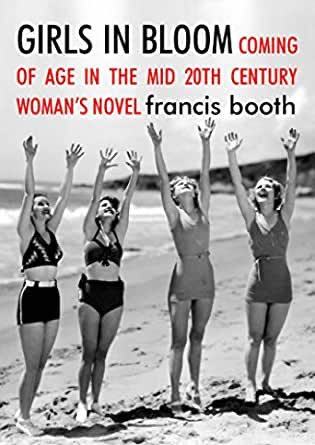
Girls in Bloom is available on Amazon US and Amazon UK
Girls in Bloom in full on Issuu
. . . . . . . . .
Cassandra’s father is a writer and had some years earlier published the avant-garde book Jacob Wrestling (a reference to Kierkegaard) to great critical acclaim though to no great sales; there is virtually no revenue from the book anymore and he has now stopped writing altogether following a short stay in prison as a result of a dispute with a neighbor.
He now spends most of his time locked away in a study, apparently doing puzzles. As well as the narrator, shy, bookish Cassandra – “I am seventeen, look younger, feel older. I am no beauty but have a neatish face.” – and her father, the household includes Cassandra’s more outgoing older sister, Rose – “nearly 21 and very bitter with life,” their younger brother Thomas and their father’s young but rather ghostlike wife Topaz.
If anyone is haunting the castle it is Topaz, a very fey character who likes to stride around the estate naked under her raincoat and play Greensleeves on the lute upstairs – not that she is exactly the madwoman in the attic; she is too fashionable for that.
Cassandra says she is “tall and pale, like a slightly dead goddess.” It is not at all clear why she stays in the dilapidated castle but she genuinely seems to love Cassandra’s father and gets on well with his daughters.
Unlike Cassandra, the younger brother Thomas attends school. “I rather miss school itself – it was a surprisingly good one for such a quiet little country town. I had a scholarship, just as Thomas has at his school; we are tolerably bright.”
There is another male character in the household who is not part of the family: Stephen, whose mother was the maid to the family and who now lives with them; he is infatuated with Cassandra but not vice versa.
Stephen writes poetry to Cassandra, or rather he copies classic poems and pretends he has written them himself. Literary Cassandra of course recognizes them but says nothing to avoid hurting Stephen’s feelings. The household is completed by two dogs, Abelard and Heloïse.
. . . . . . . . .
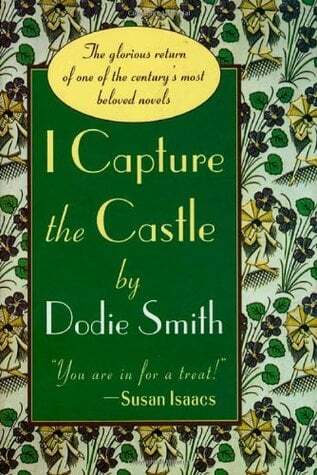
A 1948 review of I Capture the Castle
. . . . . . . . .
Shirley Jackson’s We Have Always Lived in the Castle is famous for its first paragraph, but I Capture the Castle can match it for grabbing our attention.
“I write this sitting in the kitchen sink. That is, my feet are in it; the rest of me is on the draining-board, which I have padded with our dogs’ blanket and the tea-cosy. I can’t say that I am really comfortable, and there is a depressing smell of carbolic soap, but this is the only part of the kitchen where there is any daylight left. And I have found that sitting in a place where you have never sat before can be inspiring – I wrote my very best poem while sitting on the hen-house.”
Cassandra keeps a journal and aims to write a novel. “I am writing this journal partly to practice my newly acquired speed-writing and partly to teach myself how to write a novel.”
Cassandra’s father critiques her writing, without much sympathy or enthusiasm. “The only time Father obliged me by reading one of them, he said I combined stateliness with a desperate effort to be funny. He told me to relax and let the words flow out of me.”
The only way out of their poverty appears to be Rose making a good marriage, but this seems to be impossible; we are not in Jane Austen territory, though at one point Rose enviously mentions Pride and Prejudice to Cassandra.
“How I wish I lived in a Jane Austen novel!”
I said I’d rather be in a Charlotte Brontë.
“Which would be nicest – Jane with a touch of Charlotte, or Charlotte with a touch of Jane?”
This is the kind of discussion I like very much but I wanted to get on with my journal, so I just said: “Fifty percent each way would be perfect,’ and started to write determinedly.
Later, though, Cassandra veers back to Austen, after whose sister she is named: “I don’t intend to let myself become the kind of author who can only work in seclusion – after all, Jane Austen wrote in the sitting room and merely covered up her work when a visitor called (though I bet she thought a thing or two) – but I am not quite Jane Austen yet and there are limits to what I can stand.”
The village vicar, apparently highly literary, tells Cassandra that she is “the insidious type – Jane Eyre with a touch of Becky Sharp [from Vanity Fair]. A thoroughly dangerous girl.”
Like many midcentury literary heroines, Cassandra is more Amelia “Emmy” Sedley of Vanity Fair than she is like Becky Sharp. But calling an adolescent would-be novelist a dangerous girl is exactly what the novelist St. Quentin did to Portia Quayne in Elizabeth Bowen’s The Death of the Heart.
Later in the novel, Cassandra is tempted to take confession with the vicar, “as Lucy Snowe did in Villette,” she says – reverting from Austen to Charlotte Brontë – though the vicar is not “High Church enough for confessions.”
As the extreme poverty wears them all down, Rose at one point tells Cassandra and Topaz she is considering a radical way to earn money, using her looks but without being married. “It may interest you both to know that for some time now, I’ve been considering selling myself. If necessary, I shall go on the streets.”
Cassandra points out that she cannot go street walking in the “depths of Suffolk.” Rose asks Topaz to lend her the fare to London, but Topaz tells her to continue looking for a wealthy man to marry.
This is one of many knowing asides that Dodie Smith indulges in via her narrator; she obviously loves and identifies with Cassandra, as will many readers. Smith makes sure that Cassandra is undefeated by her circumstances; chapter one ends:
“I finish this entry sitting on the stairs. I think it worthy of note that I never felt happier in my life – despite sorrowful Father, pity for Rose, embarrassment about Stephen’s poetry and no justification for hope as regards our family’s general outlook. Perhaps it is because I have satisfied my creative urge; or it may be due to the thought of eggs for tea.”
But then, a potential savior arrives: the owner of the large house next door from whom the Mortmains lease the castle has died and the house has passed to the Fox-Cottons, a family who include two young single men from America, both of marriageable age and attractive, though one of them has a beard which all three women consider unacceptable.
Worse, this is Simon, the actual heir to the estate and the most marriageable of them all. Nevertheless, despite the beard, Rose decides she must marry Simon. Cassandra will have no part in talk of marriage; she says that she would “approach matrimony as cheerfully as I would the tomb and I cannot feel that I should give satisfaction.”
It is the physical side of marriage, of which she has no personal experience, that revolts Cassandra.
Nevertheless, despite their aversion to physical contact with men and her constant fighting off of the attentions of Stephen, Cassandra does become attracted to Simon, unlike Rose, who, although she has agreed to marry Simon, does not love him; something of a Jane Austen situation.
. . . . . . . . .
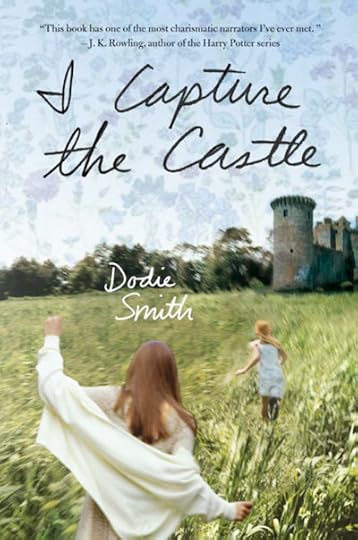
Quotes from I Capture the Castle
. . . . . . . . .
The turning point comes when the sisters and Topaz are looking at old paintings in the Fox-Cottons’ grand house with the brothers’ father and mother, Aubrey and Led.
Cassandra briefly considers whether she should marry Simon’s brother, Neil, and like Rose, have a thousand pounds spent on her trousseau with furs and jewelry to match, “everything we can possibly want and, presumably, lots of the handsomest children. It’s going to be ‘happy ever after,’ just like the fairy tales.”
But, she decides, it wouldn’t be so happy, and not just because of the physical side. What Cassandra resists is “the settled feeling, with nothing but happiness to look forward to.” She realizes what has been happening: Rose has come of age without her.
“I suddenly know what has been the matter with me all week. Heavens, I’m not envying Rose, I’m missing her! Not missing her because she is away now – though I have been a little bit lonely – but missing the Rose who has gone away forever.”
In Rose’s absence, Simon has turned his attention to Cassandra. “You are far prettier than any girl so intelligent has a right to be,” he says to her, sounding “fairly surprised.”
Cassandra tells him she’s prettier when Rose is not around. They dance to gramophone records – a luxury Cassandra has never experienced before, and he kisses her.
The Cinderella aspect of the story has long been apparent, as it is in many female coming-of-age novels, though neither the stepmother nor the sister are horrible to Cassandra and there are two princes here – enough to go around if things are to work out in Jane Austen fashion.
The tipping point comes perhaps when Rose overhears Simon and his mother talking about Proust; she has never heard of Proust. Later, Cassandra asks Simon if she should read Proust too.
Apparently, that was more amusing than it was intelligent because it made him laugh. “Why wouldn’t say it was a duty,” he said, “but you could have a shot at it. I’ll send you Swann’s Way.”
Simon has now started to see Cassandra as an adult, partly because of the new dress she is wearing – another Cinderella reference perhaps. “I don’t know that I approve of you growing up. Oh, I shall get used to it,” he says, “but you are perfect as you were.”
Cassandra realizes that it was “the funny little girl that he had liked – the comic child playing at Midsummer nights; she was the one he kissed.” He preferred her before she began to come of age.
Cassandra does not marry Simon; she realizes that “when he nearly asked me to marry him it was only an impulse – just as it was when he kissed me on Midsummer Eve; a mixture of liking me very much and longing for Rose.”
The post Cassandra Mortmain: Coming of Age in I Capture the Castle appeared first on Literary Ladies Guide.
April 22, 2023
The Making of a Marchioness by Frances Hodgson Burnett (1901)
The Making of a Marchioness is a 1901 novel by Frances Hodgson Burnett, the prolific British-American author better known for timeless children’s classics.
The author of The Secret Garden and A Little Princess wrote many novels for adult readers, though none have been as enduring as those for “children of all ages.”
Relating the story of Emily Fox-Seton, The Making of a Marchioness was followed by a sequel in the same year: The Methods of Lady Walderhurst was also published in 1901. Soon after, the two books were combined into one volume, Emily Fox-Seton, named for the heroine.
The Making of a Marchioness gained new life when it was republished by Persephone Books in 2007. Subsequently, the story was adapted by BBC radio, also in 2007, and then for television in 2012, retitled The Making of a Lady on PBS.
. . . . . . . . . . .
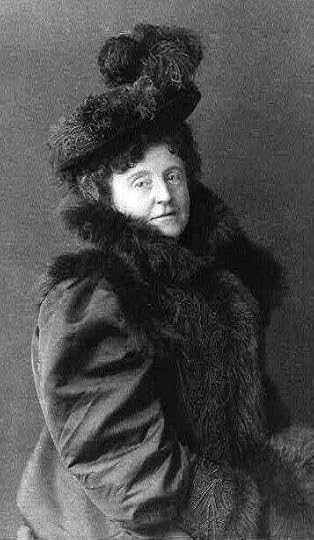
Learn more about Frances Hodgson Burnett
. . . . . . . . . .
The theme of the story is familiar to readers of Victorian literature — the well-born woman who has found herself penniless. Reflecting the reality of the times, Emily Fox-Seton has few options but to work as a lady’s companion. When the novel opens, she is in the employ of Lady Maria Bayne, a silly and selfish woman of wealth.
While within Lady Bayne’s circle, the Marquess of Walderhurst, a widower twenty years Emily’s senior met an chose to marry her. In Cinderella-like fashion, she becomes an instant Marchioness.
In the sequel, The Methods of Lady Walderhurst Emily has Walderhurt’s child, and the plot thickens. It also goes from merely a romantic Cinderella story to a commentary on Victorian marriage. The author herself was unlucky in love.
The following original review from an America newspaper seemed less than impressed, though despite its flaws, the novel and its sequel have enjoyed a revival and have apparently stood the test of time.
. . . . . . . . . . .
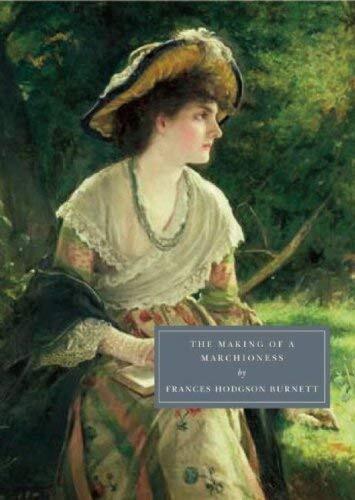
. . . . . . . . . . .
Original 1901 review of The Making of a MarchionessFrom the Louisville (KY) Courier-Journal, August 11, 1901: Old Lady Maria has a house party at Mallowe Court. Her lion is Lord Walderhurst, a widower of fifty-four, who is not shown to have any other attractions than his title and wealth. It is plain, indeed, that he has three places of more magnificence than Mallowe Court.
All the women of the house party, maids and widows — except his kinswoman, old Lady Maria, and Miss Emily Fox-Seton — do their utmost to bag his lordship, though none of them is shown to care a rap for him except as the owner of his title and estates.
Emily Fox-Seton is depicted, at first, as a really fine girl. She makes her own living in London as a purchasing agent, her home being a third-story back room in the house of a poor and kindly family with whom she boards.
She is healthy, wholesome-looking, and thoroughly, marvelously unselfish. Her only failings in common with the group of snobs with which she is thrown is her delight at the opportunity to be thrown with them, and her hyphen.
Emily is at Mallowe Court because Lady Maria has found Emily to be so unselfish. Emily is so appreciative of the privilege of loving upon Lady Maria’s snobs that she is really a better servant than the latter could otherwise obtain.
Emily has never had so much as the shadow of a dream that Lord Walderhurst could stoop to recognize her very existence.
She has never conceived that His High Mightiness could think of her as his wife, and certainly she has never been so brazen, so irreverent, so blasphemous as to think of so august a personage as the remotest possibility in her own humble, unmoneyed, untitled life.
Her only interest in Lord Walderhurst is that she shall be caught by a particular one of the women at Mallowe Court who are trying for him — the particular one who is the prettiest and poorest and needs him most in her business, since she has only the remaining part of the season to catch something or be retired to give her pretty and poor and needy sisters their chances to catch something.
But when Emily Fox-Seton is sent by Lady Maria walking four miles through the hot sun to buy fish for dinner, Emily sits down on the grass and cried because she is tired and has heard that the good London people with whom she lodges are going to leave the city. She will have to hunt some other third-story back room in which to live.
When Lord Walderhurst finds her there, he calls her “my good girl,” and bluntly tells her that he must marry. He tells her too that upon the whole she suits him better than other women — “I generally do not like women” — she is properly astounded at the honor done her, but no so paralyzed that she doesn’t gobble up the mighty personage, with his title and three estates, before she allows his out of her sight,
Of course, there is no hint of love in the whole story. His Lordship doesn’t say anything about love to Emily, and she, in return, has never once thought of him except to hope that he will marry another girl. But she is triumphantly happy in getting the old fellow herself, and everyone envies her, or is rejoiced at her good fortune.
The reader is expected to rejoice over the bewitching and beautiful read of the virtue of a poor, unselfish girl in this dazzling chance to sell herself such a marvelous and altogether irresistible price.
Did Mrs. Burnett write this story in the belief that even the best of women has her price, and that wealth and title are a price which no woman could resist, would resist, or would be expected or desired by her most ardent admirers to resist? And if not, it is for the reader to ascertain the meaning of this perplexing story.
. . . . . . . . . . .
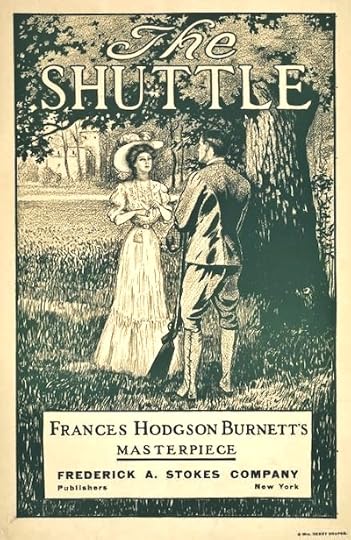
See also: The Shuttle by Frances Hodgson Burnett
More about The Making of a Marchioness Full text on Project Gutenberg Listen on Librivox Reader discussion on GoodreadsThe post The Making of a Marchioness by Frances Hodgson Burnett (1901) appeared first on Literary Ladies Guide.
April 17, 2023
Nan Shepherd, Scottish Writer, Poet, and Mountaineer
Nan Shepherd (February 11, 1893 – February 27, 1981) was a Scottish modernist poet, writer, and mountaineer. Best known for The Living Mountain, she published three novels, a collection of poems, several essays, articles, and letters, as well as
Her deep love of the Scottish mountains and her knowledge of them through walking was fundamental to her writing and shaped most of her work.
Early life and education
Anna Shepherd was born in East Peterculter, near Aberdeen on the North East coast of Scotland, in February 1893. She was the second child of John Shepherd, a civil engineer, and Jane (known as Jeannie), who came from a well-established middle-class Aberdeen family.
Her older brother Francis, known as Frank, had been born in 1890. The family moved to nearby Cults not long after she was born, and Shepherd — despite traveling widely to Europe and South Africa — lived in the same house there until nearly the end of her life.
It was here that her love of the mountains took root and was encouraged by her father, also a keen hillwalker. The hills of Deeside made a natural playground, and much of her time outside of school was spent outdoors. Later, she would write of a photograph in which she is sitting on her mother’s knee as a toddler:
“[I was] all movement, legs and arms flailing as though I was demanding to get at life — I swear those limbs move as you look at them.”
Nan was also an avid reader, and at age fourteen started the first of what she called her “medleys” — exercise books into which she would copy quotes and citations from her literary, religious, and philosophical reading.
She attended Aberdeen High School for Girls and studied at Aberdeen University, graduating with an MA in 1915.
Teaching career
Shepherd taught English literature at the Aberdeen Training Centre for Teachers (later the College of Education). She remained there until her retirement in 1956, having become known as an inspiring teacher with a feminist slant to her work.
She wryly described her role as “the heaven-appointed task of trying to prevent a few of the students who pass through our Institution from conforming altogether to the approved pattern.”
After her retirement, she continued her involvement with the literature community by editing the Aberdeen University Review from 1957 – 1963. In 1964 the University awarded her an honorary doctorate.
. . . . . . . . . . .
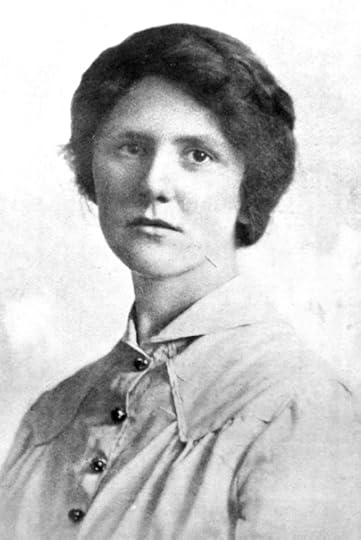
. . . . . . . . . . .
Novels and poetryIn 1933 Shepherd confessed, “I don’t like writing, really. In fact, I very rarely write. No. I never do short stories and articles. I only write when I feel that there’s something that simply must be written.”
Much of what Shepherd considered “simply must be written” was condensed into a frenetic, five-year period between 1928 and 1933. During this time, she published three novels: The Quarry Wood, The Weatherhouse, and A Pass in the Grampians. All three are modernist in style and have been compared to the writing of Virginia Woolf.
Shepherd drew inspiration from the places and people she knew well, setting her stories in the North East of Scotland, with a focus on country communities and the harsh way of life imposed by the landscape.
The Quarry Wood in particular was heavily autobiographical, and her friend Agnes Mure Mackenzie wrote saying that she had enjoyed the “transmutation, ordering, supplementing, modifying and blending” of life and fiction, in particular when she had recognized herself.
A volume of Shepherd’s poetry, In the Cairngorms, was published a year later in 1934, and most of the poems express her love of nature and the mountains. The final section of the book contains love sonnets, which Shepherd admitted were written for one man in particular, but she never revealed who it was.
She never married. Instead, she devoted much of her personal life to caring for her invalid mother, and maintained a close network of friends, including fellow writers Neil Gunn, J.C. Milne, Charles Murray, Jessie Kesson, and Hugh MacDiarmid.
“Going dumb,” and a comeback
Even at this pinnacle of her literary output, around 1931 Shepherd was feeling pressured and depressed. Writer’s block felt like an imminent problem: she wrote to Neil Gunn:
“I’ve gone dumb … I suppose there’s nothing for it but to go on living. Speech may come. Or it may not. And if it doesn’t I suppose one just has to be content to be dumb. At least not shout for the mere sake of making a noise.”
By the late 1960s, her books were out of print, and she had slipped into obscurity. When asked by the poet Rachel Annand Taylor in 1959, “Why, I wonder, did you give up literature so early?” Shepherd replied, “It just didn’t come to me anymore.”
She did continue to occasionally write, however, producing (despite her claim to the contrary) articles and a short story, Descent from the Cross, as well as more poetry.
Only in 1977, toward the end of her life, what would become her most famous work, The Living Mountain, was quietly published by Aberdeen University Press. Shepherd had first written it in the 1940s, but the manuscript was rejected by a publisher and remained in a drawer for the next thirty years.
Essentially a hymn to the Cairngorms, The Living Mountain is still famed for the unsettling beauty and lyricism of its prose. A friend and fellow poet Ken Morrice wrote shortly after its publication: “Rarely can such acute observation be matched by a gift for poetic expression. “Gentle” it is not: powerful, muscular, vivid, experiential…”
It was everything, in other words, that Shepherd herself experienced in the mountains that she had fallen so deeply, passionately in love with as a young woman.
. . . . . . . . . . .

. . . . . . . . . . .
The Cairngorms: the greatest love of Nan Shepherd’s lifeNan Shepherd had first ventured into the Cairngorms in June 1928, at the age of thirty-five. These formidable mountains, hulking to the west of Aberdeen, had previously seemed to her “a legendary task, which heroes, not men, accomplished. Certainly not children.”
This first experience of the mountains was the start of a passion that came to define both her life and her writing. From then on, she sought to escape into the Cairngorms whenever her job would allow. Often she would walk alone, although occasionally she was accompanied by friends and fellow walkers from the Deeside Field Club, or by students from the university.
For Shepherd, the goal was never really the summit of a mountain: it was not climbing up that excited her so much as “clambering down,” discovering all the hidden parts of the mountain that only an attentive walker would notice. One such place in The Living Mountain is Loch Avon:
“This loch lies at an altitude of some 2,300 feet, but its banks soar up for another fifteen hundred….From the lower end of this mile-and-a-half gash in the rock, exit is easy but very long…But higher up the loch there is no way out, save by scrambling up one or other of the burns that tumble from the heights…”
Within her poetic descriptions are threaded geology, geography, and history; her account of the routes she takes are so detailed that readers could quite easily follow in her footsteps across the Cairngorms.
The mountains, for Shepherd, were living beings, and she nurtured her relationship with them by walking. She wrote of the Cairngorms as “friends” that she “visits”, and with whom her imagination is fired as if “touched by another mind.”
“Walking thus, hour after hour, the senses keyed, one walks the flesh transparent, but no metaphor, transparent, or light as air, is adequate. The body is not made negligible, but paramount. Flesh is not annihilated but fulfilled. One is not bodiless, but essential body … I have walked out of the body and into the mountain. I am a manifestation of its total life…”
Risk and reward
Despite this all-consuming passion, Shepherd warned, “This journey to the sources is not to be taken lightly. One walks among elementals, and elementals are not governable…” She was very aware of the real dangers faced in the mountains and knew firsthand how the weather in the Cairngorms could be harsh and unpredictable.
Snow and ice — not just in winter — could make the paths hazardous, and she was intimately acquainted with accidents and deaths. One casualty was a former pupil, who was found with a man “months too late, far out of their path, the girl on abraded hands and knees as she clawed her way through drift…”
Her own experiences were often fraught with danger, and she was sometimes horrified at herself when recalling “the places I have run lightly over with no sense of fear.” Once, she was struck with snow blindness in what should have been spring:
“… I had taken no precautions against exposure … After a while I found the glare intolerable; I saw scarlet patches on the snow; I felt sick and weak. My companion refused to leave me sitting in the snow and I refused to defeat the object of his walk, which was to photograph the loch in its still wintry condition; so I struggled on, with his dark handkerchief veiling my eyes — a miserable blinkered imprisonment.”
Such experiences were, for Shepherd, a necessary risk that “we must all take when we accept individual responsibility for ourselves on the mountain, and until we have done that, we do not begin to know it.”
And knowing the mountain was essential for her, not just to write but to live; she wholeheartedly believed that only through walking and experiencing could insight be gained.
“The more one learns of this intricate interplay of soil, altitude, weather, and the living tissues of plant and insect … the more the mystery deepens.”
In search of the spiritual
The idea of “mystery” was an important one for Shepherd. There is a strong spiritual element in her writing, and she was strongly influenced by her reading on Buddhism and the Tao. On coming across the stream that would eventually become the river Dee, below the summit of Braeriach, she observed:
“These are the Wells of Dee. This is the rover. Water, that strong white stuff, one of the four elemental mysteries, can be seen here at its origins. Like all profound mysteries, it is so simple that it frightens me … It does nothing, absolutely nothing, but be itself.”
Prose, she felt, was inadequate to describe such mysteries. Poetry was the only means by which she felt she could do them justice, and yet she did not always enjoy writing poetry. She once wrote to Neil Gunn explaining her reluctance, saying that she tended to “shrink … from the subsequent exhaustion. Not being physically very strong, I grudge the way it eats up my vitality …”
It might be hard to imagine Shepherd as anything other than strong, given the physical challenges of the hills, but although she was powerful in walking she was also slight, apparently weighing just 44kg (98 lbs) in 1948.
She didn’t always have the resources that poetry demanded of her, even going to far as to say it was “eating” her, but it remained an important way for her to write about her experiences.
The result of this conflict is poetry that is unsettling, startling, beautiful, and somehow poised between worlds:
Out of these mountains,
Out of the defiant torment of Plutonic rock,
Out of fire, terror, blackness and upheaval,
Leap the clear burns,
Living water,
Like some pure essence of being…
(from ‘The Hill Burns’, In the Cairngorms)
This pursuit of the spiritual sustained her throughout her life, even when her body began to fail and she was physically confined to a nursing home in Torphins. When asked by Jessie Kesson whether she believed in an afterlife, she replied, “I hope it is true for those who have had a lean life”, but she considered her own life, even in infirmity, to be “so good, so fulfilling.”
Nan Shepherd died on February 27, 1981, at Woodend Hospital, Aberdeen, Scotland.
. . . . . . . . .

Nan Shepherd on the Scottish banknote
. . . . . . . . .
Despite the obscurity that characterized much of her life (and which Shepherd herself undoubtedly enjoyed as a very private person), she’s known today as one of the foremost Scottish modernist writers.
Her novels were republished in the late 1980s. The Living Mountain and In the Cairngorms were reprinted later (the latter with a foreword by eminent nature writer Robert Macfarlane and an afterword by writer Jeanette Winterson).
She is anthologized in collections of Scottish women poets, and a stone dedicated to her was laid at Makars’ Court in Edinburgh in 2000, with the engraving “It’s a grand thing to get leave to live.”
Nan Shepherd is the first woman writer to be featured on a Scottish banknote, and the Nan Shepherd Prize is granted annually to underrepresented voices in nature writing.
. . . . . . . . .
Contributed by Elodie Barnes. Elodie is a writer and editor with a serious case of wanderlust. Her short fiction has been widely published online and is included in the Best Small Fictions 2022 Anthology published by Sonder Press. She is Books & Creative Writing Editor at Lucy Writers Platform, she is also co-facilitating What the Water Gave Us, an Arts Council England-funded anthology of emerging women writers from migrant backgrounds. She is currently working on a collection of short stories, and when not writing can usually be found planning the next trip abroad, or daydreaming her way back to 1920s Paris. Find her online at Elodie Rose Barnes.
More about Nan ShepherdMajor Works
In the Cairngorms (1934)The Living Mountain (1977)The Grampian Quartet: The Quarry Wood, The Weatherhouse, A Pass in the Grampians,The Living Mountain (2001)Wild Geese: A Collection of Nan Shepherd’s Writing, edited by Charlotte Peacock (2019)
Biography
Into the Mountain: A Life of Nan Shepherd by Charlotte Peacock (2021)Wanderers: A History of Women Walking by Kerri Andrews (2021; includes a section on Nan Shepherd)More information
Scottish Poetry Library How Nan Shepherd Remade My Vision of the Cairgorns Wikipedia Reader discussion on GoodreadsThe post Nan Shepherd, Scottish Writer, Poet, and Mountaineer appeared first on Literary Ladies Guide.
April 14, 2023
The Ghetto at Florence, an 1886 essay by Amy Levy
Beginning in 1886, Amy Levy wrote several essays on Jewish culture and literature for The Jewish Chronicle. The best known is The Ghetto at Florence, presented here. Others in this series included The Jew in Fiction, Jewish Humour, and Jewish Children.
Amy Levy (1861 – 1889) was a 19th-century British novelist, essayist, and poet. She was best known for Reuben Sachs, an 1888 novel that examined Jewish life in Victorian England, a subject that was unusual for its time.
Despite talent and accomplishment, this promising writer died by her own hand when not quite twenty-eight years old following years of struggle with depression.
. . . . . . . . . .
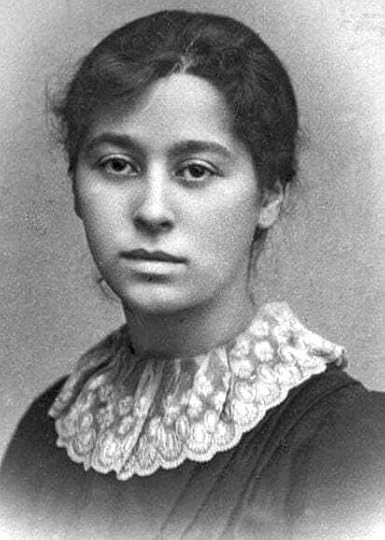
Learn more about Amy Levy
. . . . . . . . . .
From a correspondent; dateline: Florence, March 19, 1886: They are going to pull down the Ghetto at Florence; it is an old, old dismantled structure “springing seven stories high,” staring at you with innumerable sashless windows, like the vacant eyes of the blind.
It stands in the old market, where the picturesque busy life goes on buzzing and stirring very much as it did in the days when Tito Melema bought a cup of milk of poor Tessa with a kiss. It is in the very heart of the town; from window, and archway and passage you obtain glimpses of the matchless architectural mass composed by the Duomo and Campanile that many-tinted, many-faceted jewel of which Florence is but the rich and seemly setting.
Long ago, the Ghetto was a palace of the Medici family. It was not till the 16th century that Cosimo I made it over to the Jews, whom he had summoned to Florence to act as a check on the Italian money-lenders; we are left to guess at the extortions of these Christian usurers; we only know that 20 per cent was fixed as a moderate rate of interest for their Jewish successors!
The Jews continued to dwell in the old Ghetto (and very huddled up they must have been, if their rate of multiplication was up to its usual average) until modern toleration set them free, and modern sanitary science declared their dwelling place unfit for human habitation.
Then the great arched doorways, solid and satisfying in their strong curves, were boarded up; the very panes went from the windows; from top to bottom those crazy seven storeys were a squalid and dismantled ruin.
They set up a turnstile at the back of the building, and on payment of half a lire the casual stranger could wander at will amid the endless passages and stairways, the dusky intricacies of Cosimo’s palace, for which more changes were yet in store.
For by the end of Carnival, the poor old structure had undergone a complete transformation. The dingy walls were painted in gay stripes, Eastern rugs hung from the empty windows, coloured lanterns were swinging over the doorways, themselves draped and gilded out of all knowledge.
Great posters announced the fact that the “Citta di Bagdhad” was to be seen in the Ghetto.
All through Carnival week those old courts and archways echoed to the mirth of the masquers, and now quieter folk have taken to drinking their evening coffee in the tricked out Ghetto-Palace.
There is nothing that need remind one of the cramped life that once thronged and huddled and swarmed here, that need call up unpleasant memories of the sordid, struggling, choked existence that went on wearily from generation to generation. It is true that the cells and arches are very close together, but they are hung charmingly with gay stuffs, and the shop-men, with their red caps and Tuscan faces, are more than picturesque.
Actually there are real camels to be seen and real studio-models posing as Orientals in all the glory of turban and fez. Down below the walls are painted so gaily that you forget to look upwards at the gloomy storeys above, at the crowding, empty windows.
But now and then you may find yourself strolling unawares down some tortuous passage out of sight of the lanterns, out of hearing of the band, away from the fuss and stir of a modern pleasure-place.
How dreary, how inexpressibly gloomy it is! Even the moonlight, that wonderful moonlight of an Italian spring, cannot penetrate into these courts and alleys, around which the tall, tall houses crowd so closely.
The air strikes chill and damp; are those human faces, or the faces of ghosts, that peer so wistfully through the grated lower windows? Is it the sound of human footsteps, or the sound heard in a dream, that echoes on the close, irregular pavement, that startles one from the gloom of unexpected angles and archways?
It is only sentimentalists, like ourselves, that trouble themselves in this unnecessary fashion. There are a great many Jews here to-night, evidently quite undisturbed by “inherited memory.”
A sprightly, if unhandsome, son of Shem urges us, in correct cockney, to take shares in a lottery; another, with his wife on his arm, trips gaily from booth to booth; the repressed energy, the stored exuberance of centuries is venting itself with its wonted force.
We ourselves, it is to be feared, are not very good Jews; is it by way of “judgment” that the throng of tribal ghosts haunts us so persistently tonight? That white-bearded old man peering round the corner, surely it was he that Mantegna chose for the model for his famous Circumcision? 30
The Jews have ceased to dwell in the Ghetto, but they have by no means ceased to dwell in the city. They swarm in the quaint streets adjoining the old market, and in more important thoroughfares such names as Dante Levi stare at us in hybrid significance from the shop-fronts.
But you do not here identify the Jew with the same ease and readiness as in England or Germany. There is no doubt, for instance, about the inhabitants of Petticoat Lane, or the Brühl at Leipsic, apart from all accident of locality.
But sometimes, when a dark face peers at you from a doorway of the Mercato Vecchio, and a pair of shrewd, melancholy eyes meet with your own, you are puzzled at the equal suggestion of Jew and Florentine in their glance.
Who knows but that, long ago, those old and mystic races, the Etrurians and Semites, were kinsfolk, pasturing their flocks together in Asia Minor? But this is opening up a very big question, over which wiser heads than our own have puzzled often and in vain.
Let us go back and take our farewell of the Ghetto, where the lights are still shining and the band still playing. Poor old Palace-Prison! this is positively your last appearance; you are very splendid, but it is only a funeral pomp, after all. The lamps flicker, the people stream out, the musicians play louder and louder,
That when he dies he make a swan-like end,
Fading in music.
Note: Here, Levy misquotes Shakespeare, Merchant of Venice, III.ii.4345. The correct quote is:
Then if he lose he makes a swan-like end,
Fading in music.
Further reading
Amy Levy: Critical Essays, edited by Naomi Hetherington and Nadia Valman, Ohio University Press, 2010.Beckman, Linda Hunt, Amy Levy: Her Life and Letters. Athens: 2000.Dwor, Richa. “’Poor Old Palace-Prison!’— Jewish Urban Memory in Amy Levy’s ‘The Ghetto at Florence’ (1886) ” Partial Answers: Journal of Literature and the History of Ideas vol. 13, no. 1 (January 2015). The Ghetto as Victorian TextThe post The Ghetto at Florence, an 1886 essay by Amy Levy appeared first on Literary Ladies Guide.



